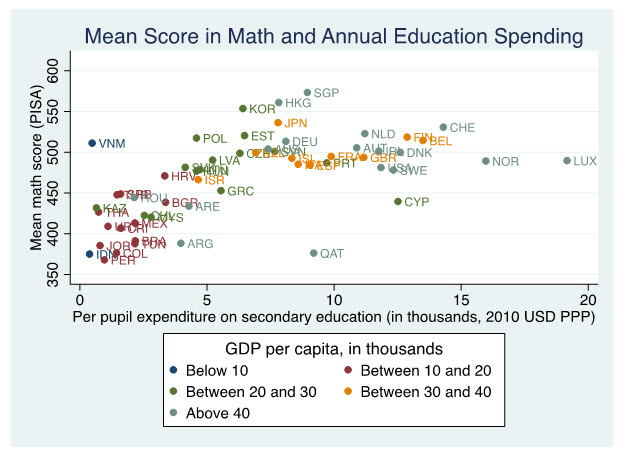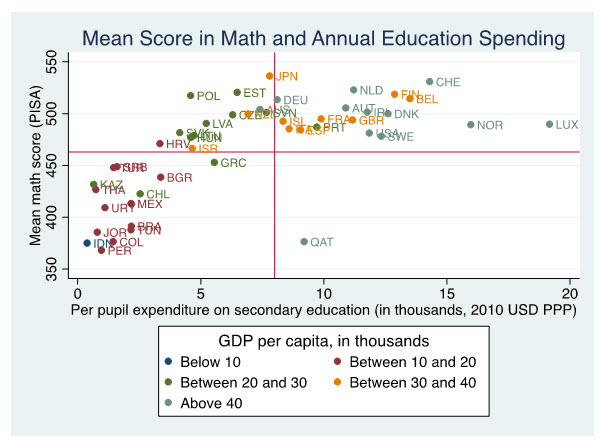Money or Education, Which is More Important/Better? (Debate)
- Post author: Edeh Samuel Chukwuemeka ACMC
- Post published: March 3, 2024
- Post category: Scholarly Articles
Money or Education, Which is more Important? (Debate): So, which is more valuable: education or money? Which one should we concentrate on? This appears to be a simple question, but when we think about it, the answer is not that straightforward. Money and education are inextricably linked in our daily lives. On the one hand, money is what drives the majority of our lives.
We have to think about money in practically every decision we make. Education, on the other hand, cannot be overlooked since it provides us with the fundamental tools we require to live. Let’s weigh in on their relative importance and see if we can finally settle this age-old argument.

Recommended: Advantages and Disadvantages of studying abroad
Table of Contents

Why Money is Important
Money is commonly said to be “ not the most important thing in the world.” However, for many individuals, it is right up there with oxygen in terms of significance. These aren’t necessarily materialistic individuals. They just recognize the genuine worth of money.

Money isn’t exciting on its own. What matters is what money can accomplish for you. You have more flexibility and options when you have money. When you have a strong salary or financial resources, you have the freedom to choose where and how you wish to live. When you don’t have much money, on the other hand, making choices may be something you can’t afford. In actuality, the choices available to you may not be choices at all.
Also see: Most profitable skills to learn this year
Undoubtedly, you’ll require money to meet your fundamental needs, which include food, clothes, and shelter. Because of a lack of funds, a poor individual is frequently forced to make compromises even on essential basic requirements. Moreover, medical expenditures nowadays consume a person’s whole life savings. Furthermore, one must have money to obtain an education, as the cost of school is quite expensive these days and is not likely to decrease anytime soon.
While money cannot purchase happiness, it may give you independence, stability, and the ability to follow your aspirations. As a result, money is unquestionably necessary for every excellent thing that provides us financial satisfaction.
Recommended: How to spend less and save more
Why Education is Important
Today, education is more vital than ever before, and it has reached new heights as people have a better knowledge of what it comprises. If you ask yourself, “Why is education important?” your response will almost certainly not be the same as everyone else’s. While having a college degree is tremendously important for a successful profession and is socially acceptable in today’s culture, it is not the sole source of education. In everything we do, education is all around us.

Education may help you become the greatest, most complete version of yourself by allowing you to learn about what interests you, what you’re excellent at, and how to become self-aware and aware of the world around you. It can assist you in finding your position in the world and making you feel whole. Basic life skills and street smarts are built on the foundation of education. While education may appear to be a technical phrase, it refers to all we learn in life on how to live our lives to the fullest. When it comes to being creative in any manner, shape, or form, the mind can only achieve its full potential if it’s given the tools to think outside the box.
Education gives you a sense of stability in life, which no one can ever take away. You boost your prospects of greater professional options and create new doors for yourself by being well-educated. Education gives financial security in addition to stability, which is very important in today’s culture. An excellent education is more likely to lead to a higher-paying career and provide you with the necessary skills. It might provide you with the freedom to make your own decisions as well as be financially independent. Education has the potential to be the most liberating and empowering thing in the world.
Recommended: How to become a successful business entrepreneur
Money vs Education, Which is More Important
Money is required for basic expenses, but that is not the only requirement. Money helps us reach our objectives and support the things we care about most, such as family, education, health care, charity, adventure, enjoyment, and so on. It assists us in obtaining some of life’s intangibles, such as freedom or independence, as well as the opportunity to maximize our abilities and talents. It allows us to chart our path in life. It ensures financial safety. Much good may be accomplished with money, and unnecessary suffering can be prevented or eliminated.
Education, on the other hand, is essential for survival. Everyone needs education at some point in their lives to improve their knowledge, manner of life, and social and financial standing. Although it may not provide you with financial standing in society, a literate mind will undoubtedly set you apart. Education is amazing in that it is not restricted by age.
While money gives us the ability to make a difference in our own lives and the lives of others, it is impossible to obtain an education without it. The cost of education is quite expensive these days, and it will continue to rise in the near future. Education may be too expensive, particularly at private institutions and universities. While you don’t have to pay back your student loans until after you graduate, the payment will ultimately come due. Without funding, education would come to a halt.
Also see: Best side hustles for teachers to make extra money
In a different light, money may be able to buy what you “ desire ,” but education helps you to realize what you “need” to live a better life. This is demonstrated by the numerous non-monetary advantages that may be obtained via education. Money may allow us to have more control over our lives, but it is education that allows us to contribute to society. Although money is useful, an educated individual understands how to make money in the first place. Education has the potential to open up job opportunities.
With an education, you have the potential to earn more money than others who do not. Obtaining a degree might expand your options in some professions, allowing you to make more money. Many employers provide educational incentives to their workers. Anyone who stays up with current trends will always be able to make more money. If you are well educated, your chances of living in poverty are lower.
Furthermore, you cannot lose or be stripped of your education. Whatever happens, the lessons you’ve learned will be with you. Even if you lose a wonderful job, your degree and experience will assist you in finding work in the future. When a financial catastrophe strikes, you can’t lose what you’ve learned. Even if you become indebted due to unforeseen circumstances, your education will not be taken away from you.
Nevertheless, much of the narrative about the benefits of going to college and having a degree is centred around the concept that if you have a degree, you’ll be able to make more money. For many people, education is only a means to an end, which is monetary gain.
Some believe, however, that if generating money is your primary incentive for pursuing a profession, you might explore trade schools and other qualifications that may help you earn a fair living. After all, while many people dismiss trade skills such as plumbing and electrical labour, these individuals may amass money more quickly than their more educated counterparts. We frequently read about people who have amassed enormous wealth while having had very little formal education. In fact, having a degree does not ensure that you will earn more since many people without a degree make more money than graduates.
Regardless, education will assist you in developing a decent character, a noble personality, and, above all, will help you become a better person. You will not only be able to make money with education, but you will also be able to efficiently use the money you have made to benefit yourself and others. Money is a slippery slope, but those who figure out what they genuinely value and match their money with those beliefs have the most financial and personal well-being. Education is necessary to become such a person. Never forget that knowledge is power.
Recommended: Countries with the best education system in the world
Money vs Education is a perennial debate. The common view of money and education in our lives has been emphasized in this article. Everyone, after all, has their unique point of view.

Edeh Samuel Chukwuemeka, ACMC, is a lawyer and a certified mediator/conciliator in Nigeria. He is also a developer with knowledge in various programming languages. Samuel is determined to leverage his skills in technology, SEO, and legal practice to revolutionize the legal profession worldwide by creating web and mobile applications that simplify legal research. Sam is also passionate about educating and providing valuable information to people.
This Post Has 4 Comments
Money is important but education is far more important cuz money is the root to all evil while education is power
Money or education which is more important?
Education is the best, only to those who value it and know how to make use of it Education can bring money, but money at the other side can never bring education Even, a renown people in this world are educated.
Comments are closed.

DEBATE TOPIC: Education is Better than Money ( Support and Oppose the motion)
Explore the ongoing debate about whether education holds more value than money . This comprehensive article delves into the advantages of education, its impact on personal growth, and the role of money in achieving success.
In the eternal debate of education is Better than Money, both sides have valid points to consider. Education and money are undeniably powerful tools that can significantly influence our lives. While money enables us to access resources and opportunities, education equips us with knowledge and skills for personal and professional growth. Let’s delve into the depths of this debate and understand how education can be perceived as more valuable than money in various aspects of life.
DEBATE: Education is Better than Money
In this section, we’ll explore the reasons why education holds a distinct advantage over money and how it contributes to personal development, societal progress, and long-term success.
1. Lifelong Learning for Personal Growth
Free download now.
Education is a journey that doesn’t end with graduation. It fosters continuous learning and intellectual curiosity, allowing individuals to evolve and adapt to changing circumstances. With education, you gain the ability to think critically, analyze situations, and make informed decisions, which are essential for personal development.
2. Knowledge as an Asset
While money can be spent and lost, knowledge is an asset that grows over time. Acquiring education ensures that you have a valuable resource that can never be taken away. It empowers you to innovate, solve problems, and contribute meaningfully to society.
3. Empowerment and Self-Confidence
Education instills a sense of empowerment and self-confidence. When you’re well-educated, you’re equipped to face challenges head-on, communicate effectively, and pursue your passions with conviction. This self-assuredness is a priceless asset in both personal and professional spheres.
4. Shaping Critical Life Skills
Education goes beyond academic subjects; it imparts life skills such as communication, time management, and teamwork. These skills are fundamental for success in any field and play a crucial role in building well-rounded individuals.
5. Fostering Innovation
Innovation is at the heart of progress. Education fuels innovation by encouraging you to question the status quo, explore new ideas, and develop groundbreaking solutions to real-world problems.
6. Social Impact and Empathy
Education enhances your understanding of diverse cultures, perspectives, and societal issues. This broader awareness fosters empathy and a sense of responsibility towards making positive contributions to the community.
7. Long-Term Career Success
While money can provide short-term gains, education paves the way for sustained career success. It opens doors to better job opportunities, higher earning potential, and the ability to adapt to changing industries.
8. Wealth of Experience
An educated individual accumulates a wealth of experiences through learning, which enriches their life journey. These experiences contribute to personal growth, relationships, and a deeper appreciation of the world around them.
9. Redefining Success
Success is often equated with financial prosperity, but education challenges this notion. It encourages you to define success based on personal fulfillment, contribution to society, and the positive impact you make.
10. Enabling Social Mobility
Education is a powerful tool for social mobility. It provides opportunities for individuals from diverse backgrounds to overcome socioeconomic barriers and achieve their aspirations.
FAQs about the Debate “ Education is Better than Money”
Q: does education guarantee financial success.
Education enhances your skill set and knowledge, increasing your potential for higher earning opportunities. However, financial success depends on various factors, including market demand and personal choices.
Q: Can money buy happiness?
Money can provide comfort and security, but true happiness often stems from fulfilling relationships, meaningful experiences, and a sense of purpose, which education can contribute to.
Q: Is it wise to pursue education without considering earning potential?
While education enriches your understanding of the world, considering potential career prospects is essential to ensure financial stability and a well-rounded life.
Q: How can one balance educational debt with financial goals?
Striking a balance between repaying educational debt and saving for the future requires prudent financial planning and budgeting skills, emphasizing the importance of both education and financial stability.
Q: Can wealth be amassed solely through formal education?
While education provides a foundation, financial success often involves additional factors such as entrepreneurship, investment strategies, and adapting to market trends.
Q: Is philanthropy achievable without substantial wealth ?
Philanthropy is not exclusive to the wealthy. Even modest resources, combined with a commitment to positive change, can contribute to meaningful philanthropic endeavors.
The debate “Education is Better than Money” encapsulates the dynamic interplay between intellectual growth and financial prosperity. As this discourse unfolds, it becomes evident that both education and money hold their own distinct value and significance. The key lies in harnessing the potential of education to make informed financial decisions and leveraging financial resources to create a positive impact on oneself and society.
Leave a Comment Cancel reply
Save my name, email, and website in this browser for the next time I comment.
This site uses Akismet to reduce spam. Learn how your comment data is processed .

What Is More Powerful? Education vs Money
21 april, 2020 , read more education.

We can give your business a digital turnover! Get your Ad published on our website for absolutely free.

© Copyright 2020-2022 BLOG SURVEYTOEARN. All rights reserved.
Why money matters for improving education
Subscribe to global connection, emiliana vegas emiliana vegas former co-director - center for universal education , former senior fellow - global economy and development @emivegasv.
July 21, 2016
For at least four decades, economists have analyzed the relationship between per student spending and learning outcomes across the United States and, more recently, across countries around the world. In 1996, as a result of a Brookings conference, the influential book “Does Money Matter?: The Effect of School Resources on Student Achievement and Adult Success ” was published, edited by economist Gary Burtless and with contributions from several well-known economists. The book focuses on the puzzle between research evidence from the U.S. that found that more resources did not necessarily result in improved student achievement and evidence showing that students who attend well-resourced schools end up having better outcomes later in life than students who attend poorly-endowed schools.
Indeed, a simple correlation analysis using cross-country data suggests that there is at best a weak relationship between student achievement and education spending. In other words, when comparing per pupil spending and average learning outcomes per country, we find that countries with similar levels of spending per student also show enormous differences in how much their students learn. Figure 1 shows the simple correlation between mean scores in math in the Organization for Economic Co-operation and Development’s (OECD) Program for International Student Assessment, or PISA, and per pupil spending in secondary education for each of the countries that participated in PISA 2012. It is easy to see that students in countries like Qatar and Singapore, which spend similar amounts of dollars per student, achieve vastly different PISA math scores.
Figure 1: Per pupil spending and mean math scores in PISA 2012, by country

Source: Vegas and Coffin, 2015 .
Working in developing countries throughout my career, I was always struck by the weak relationship between spending and outcomes. While, it was clear that differences in student learning between countries with similar spending levels, such as Qatar and Singapore, support the leading argument that how money is spent in education is more important than how much , I wondered whether this was only the case for countries that spend above a minimum level—a level that guarantees a minimum standard of basic inputs to ensure adequate learning opportunities for all.
Could in fact countries that spend little on education achieve good learning outcomes by simply spending more efficiently?
With my colleague Chelsea Coffin, I set out to explore the relationship between per pupil spending and learning, particularly in developing countries that spend much lower levels in education than do OECD countries. To do this, we separated countries that have participated in PISA into two groups based on their level of per pupil expenditure: a low-spending group, comprised of countries that spend less than a certain threshold per student; and a high-spending group, which included the countries that spend more than that threshold. Then, we designed separate regressions to estimate the relationship between spending and student learning (as measured by PISA) within these two groups of countries. We wanted to see if, among the low-spending group, more spending is associated with higher outcomes. Additionally, we wanted to estimate the per pupil spending level at which more money no longer can be associated with higher learning outcomes.
Put simply, our underlying hypothesis was that if Haiti only spends $100 per student, common sense suggests that it cannot reach the average learning levels of OECD countries that spend much more per student. However, does the country need to increase spending to the U.S. level ($11,732) or Finland’s level ($9,353) in order for their students to be able to learn the basic skills necessary compete in today’s global economy?
Our findings, reported in the Comparative Education Review suggest that, when education systems spend above $8,000, the association between student learning and per student spending is no longer statistically significant. Therefore, we find a threshold effect after this level of resources is met, indicating a declining relationship between resources and achievement at high levels of expenditure (consistent with other recent literature). This can be seen in Figure 2, where there is a positive relationship between student learning and per pupil expenditure among the low-spending countries (below $8,000 per student), but a flat relationship among high-spending countries.
Figure 2: Per student expenditures and mean math scores, separating low- from high-spending countries

One interpretation of our analysis, consistent with prior studies, is that efficient spending is more important among systems that already provide the basic inputs necessary for a quality education (as measured by their average spending per pupil). High spenders might also spend more on programs that compensate for students with disadvantaged backgrounds, helping mitigate inconsistent gains in test scores or proficiency. But when low spenders increase expenditure, it may be used to establish basic conditions or increase quality to a minimum standard, although efficient use of these resources may also be a constraint to achieve high levels of learning for all.
Our findings are also important in light of another strand of the economics literature. Research on the factors that explain differences in student learning has empirically demonstrated that, from the school side, high quality teachers (as measured by teachers’ capacity to generate learning in their students, or teacher value-added) are the most important determinant of student learning (See Hanushek 2011 , Hanushek and Kain 2012 , and Chetty et al 2014a and 2014b ). Influenced by this evidence, international organizations have prioritized attracting, motivating, and retaining talented teachers as a means to improving learning outcomes. And, like in any other profession, compensation matters. Unfortunately, only in a few countries is teaching a truly competitive career for talented professionals.
In short, improving education outcomes in Latin America and the Caribbean requires more and better investment. These countries still need to increase overall spending for education in order to provide the basic learning inputs to students. More importantly, in too few if any countries in Latin America is teaching a valued profession that attracts the most talented individuals. While some countries have introduced bold reforms to improve teaching conditions, attract better professionals, and set up teacher evaluation systems to guide teaching practices, much more remains to be done to ensure that all Latin American students have access to effective teachers.
Global Education
Global Economy and Development
The Brookings Institution, Washington DC
8:30 am - 4:30 pm EDT
Thinley Choden
May 3, 2024
Ghulam Omar Qargha, Rachel Dyl, Sreehari Ravindranath, Nariman Moustafa, Erika Faz de la Paz
- Skip to main content
- Keyboard shortcuts for audio player
School Money
Can more money fix america's schools.

Cory Turner
Kevin McCorry
Sarah Gonzalez
Kirk Carapezza
Claire McInerny
Week 2: Can More Money Fix America's Schools?
This winter, Jameria Miller would often run to her high school Spanish class, though not to get a good seat.
She wanted a good blanket.
"The cold is definitely a distraction," Jameria says of her classroom's uninsulated, metal walls.
Her teacher provided the blankets. First come, first served. Such is life in the William Penn School District in an inner-ring suburb of Philadelphia.
The hardest part for Jameria, though, isn't the cold. It's knowing that other schools aren't like this.
Before her family moved closer to the city, where they could afford more living space, she attended the more affluent Upper Moreland district, which is predominantly white and, according to state and local records, spends about $1,200 more per student than William Penn.
That difference adds up, Jameria says, to better buildings, smaller class sizes, take-home textbooks and less teacher turnover.
"It's never going to be fair," she says, comparing her life now to her former classmates. "They're always going to be a step ahead of us. They'll have more money than us, and they'll get better jobs than us, always."

The Miller family sits in the living room of their home in a Philadelphia suburb. They are part of an ongoing lawsuit, arguing Pennsylvania has neglected its constitutional responsibility to provide all children a "thorough and efficient" education. Emily Cohen for NPR hide caption
The Miller family sits in the living room of their home in a Philadelphia suburb. They are part of an ongoing lawsuit, arguing Pennsylvania has neglected its constitutional responsibility to provide all children a "thorough and efficient" education.
So Jameria's parents have signed onto a lawsuit, arguing that Pennsylvania's school funding system is unfair and inadequate. To the Millers, money matters.
But not everyone agrees.
"It's not about the dollars," says Stan Saylor, chairman of the education committee in Pennsylvania's House of Representatives. "It's where that local school district spent those dollars over the last many years."
And Saylor is not alone.
About The 'School Money' Project
School Money is a nationwide collaboration between NPR's Ed Team and 20 member station reporters exploring how states pay for their public schools and why many are failing to meet the needs of their most vulnerable students. This story is Part 2 of 3. Join the conversation on Twitter by using #SchoolMoney .
"Money isn't pixie dust," declared the Texas assistant solicitor general, arguing his state's side of a school funding lawsuit before the Texas Supreme Court. "Funding is no guarantee of better student outcomes."
This idea, that sprinkling more dollars over troubled schools won't magically improve test scores or graduation rates, is a common refrain among many politicians, activists and experts. And they have research to back it up.
This report on school spending from the libertarian Cato Institute is just one entry in a decades-long body of work that suggests there is little to no link between spending and academic achievement. And so, again ...
"Use the money you have more wisely and educate our children," says Jon Caldara of Colorado's Independence Institute, a free-market think tank.
In short, these critics say, it's How You Spend School Money, not How Much You Spend .
This debate has raged for at least half a century, and today we're going to put both sides under a microscope.
What follows here, as with the first installment in the School Money series, is a wrap-up of our reporting. For nearly every name and place, you'll find a hyperlink to more.
Like this story, for Jameria Miller.
Last week, we explored the question, "How do we pay for our public schools?"
This week, we ask: "What difference can a dollar make in our schools?"
Or, better yet, "Is money pixie dust?"
The answer begins in a place not known for magic: Congress.
The Coleman Report
Section 402 of the landmark Civil Rights Act of 1964 is short, just a paragraph long, but it demanded something huge: The federal government had to conduct a nationwide survey "concerning the lack of availability of equal educational opportunities for individuals by reason of race, color, religion, or national origin." The results were to be reported back to Congress.
James S. Coleman, a sociologist, was tapped for the job. And he did not take it lightly. By the time Coleman filed his 700-page report , he and his team had surveyed some 650,000 students and teachers nationwide.

James S. Coleman, 1958. JHU Sheridan Libraries/Gado/Getty Images hide caption
"It was the most comprehensive data set, that was nationally representative, ever collected," says Kirabo Jackson, a researcher at Northwestern University. "It's actually the first time anyone had collected data that linked the characteristics of children in the home to their outcomes in school."
The day Coleman released his report, in 1966, Eric Hanushek was a graduate student in economics at MIT, eagerly hunting for a thesis project. He found it in one of Coleman's headline findings.
"Coleman explicitly said families are important and, after that, schools contribute very little," recalls Hanushek, now a senior fellow with the Hoover Institution at Stanford University. "And also that resources contribute very little."
Family matters, Coleman found; schools matter less. And how much money schools spend on their students doesn't seem to matter much at all.
"This is crazy," Hanushek remembers thinking. "If schools don't matter, why do we pay so much attention to them?"
In the decades since, Hanushek has become a chief spokesman for the How You Spend movement, arguing that pouring more money into troubled schools won't necessarily fix them. To make his case, he offers a few examples. Here's one:
Camden, N.J.
Something remarkable happened in New Jersey in the late 1990s.
As part of a long-running school funding lawsuit known as Abbott v. Burke, the state increased spending in 31 of its then-poorest districts, dubbed Abbott districts. In fact, they got so much new money that spending in some of them eclipsed spending in some of the state's wealthiest districts.
School Funding In New Jersey

Credit: Katie Park/NPR
This remarkable investment in New Jersey's poorest schools turned heads and made headlines across the country. And, if money truly matters, Hanushek says, then the Abbotts should be a success story.
But, he points out, all these years later, many are still "spending 2.5 times the national average, and there's no real evidence that they're closing the achievement gap or that they're doing significantly better."
One of those districts, Camden, is spending roughly $23,000 per student this year. And Hanushek is right about the results. While schools there have improved under Superintendent Paymon Rouhanifard, student performance is still abysmal.
A third of the district's seniors don't graduate on time, and more than 90 percent of high school students there are not proficient in either language arts or math.
Part of the problem has been mismanagement. Before Rouhanifard, Camden struggled with corruption and went through 13 superintendents in 20 years.
Much of that extra money is also paying for important things that had long been ignored.
"If you read the stories about Camden from the early '90s, late '80s, it was a really, really horrendous situation," says Rouhanifard. "Schools couldn't offer basic meals for their kids. They didn't even have cafeterias. They didn't have basic textbooks."
He says the additional funding changed that, and to focus only on low test scores overlooks the good it's done.
Perhaps the biggest challenge facing Camden's schools boils down to one word: poverty.
Nearly half of the district's students live in poverty and nearly all qualify for free- or reduced-price lunch.
In high-poverty districts, children often arrive at school needing things that more affluent districts simply don't have to provide — but providing them won't necessarily improve test scores.
And this challenge extends well beyond Camden. Nationwide, 1 in 5 children lives in poverty.
"If kids are coming to school without the basic health and nutritional supports, you need to do that," says Linda Darling-Hammond, who studies school policy at Stanford University.
Darling-Hammond says any educator will tell you: It's tough to teach a child who is chronically hungry. Or sick. Or cold, like Jameria in Philadelphia.
But, as with textbooks and teacher salaries, addressing the symptoms of poverty costs schools precious money.
For more on Camden, click here .
'Doomed' Without Preschool
To meet the needs of its disadvantaged students, North Carolina has focused much of its effort — and dollars — on one big intervention: preschool.
In the 1990s, a handful of low-income districts sued the state, arguing insufficient funding. Wake County Superior Court Judge Howard Manning found that, for most students, the state's schools and their funding were good enough.
It was a different story, though, for what Manning called "at-risk" students — among them, kids with disabilities, living in poverty or learning English as a second language. In his October 2000 decision, Manning didn't mince words:
"At-risk children, who are not presently in quality pre-kindergarten educational programs, are being denied their fundamental constitutional right to receive the equal opportunity to a sound basic education."

Superior Court Judge Howard Manning presides over a Leandro education hearing in a Wake County courtroom on July 23, 2015. Manning retired last year. Chris Seward/News Observer hide caption
Superior Court Judge Howard Manning presides over a Leandro education hearing in a Wake County courtroom on July 23, 2015. Manning retired last year.
Manning ordered the state to provide free preschool for any child considered at-risk. Not as an option, he argued, but as an obligation.
"The Court is not so naïve as to think that every single at-risk child will be an academic superstar as a result of this early childhood intervention," Manning wrote, "but the Court is convinced that without this intervention more children will be doomed to the academic basement."
A new study from the National Institute for Early Education Research at Rutgers University is just the latest to suggest that preschool, when it's high-quality, can narrow achievement gaps before they grow too wide.
With strong support from the state's then-new governor, Mike Easley, the program grew quickly. At peak enrollment, in the 2008-09 school year, it provided free preschool to roughly 35,000 at-risk kids at a cost of $170 million.
Did it work?
Ellen Peisner-Feinberg, of the University of North Carolina at Chapel Hill, has studied the state's pre-K program since it began. She's found that children who attend make greater-than-expected gains in kindergarten.
"This is particularly true with dual-language learners and children who have lower levels of English proficiency," says Peisner-Feinberg.
But it's not all good news.
She found that some of those preschool gains fade by the time these students leave third grade. For state lawmakers, that was one reason to scale back. When the Great Recession hit, they cut the program to serve 6,000 fewer students.
Judge Manning blamed the fading benefits not on the preschool program but on the lackluster schooling that many students received in later years.
"They've been screwed over by first grade, second grade, third grade," said Manning in a presentation at North Carolina State University in 2011. "The academic prop they got [from preschool] fizzled because they probably weren't challenged and were just treated like poor kids without expectations."
For more on North Carolina, click here .
Mission Creep
To some, the fact that schools are spending money to alleviate the symptoms of poverty is a kind of mission creep.
At a press conference last year, as the Indiana General Assembly was re-writing its school funding formula, state Rep. Tim Brown, a Republican, put it this way:
"You know, one of the things about education is money to help those kids who are outside the educational problem. You know, did Mary's mother get arrested the night before? Did Johnny not come with shoes to school? Those aren't to me core issues of education."
They affect education "a lot," Brown said, but help should come from outside organizations, not necessarily schools.
That may explain why lawmakers there decided to scale back the extra money they had been sending to schools that educate lots of disadvantaged kids.
School Funding In Indiana

Those dollars have made a big difference in Goshen, a small, northern Indiana town where low-wage manufacturing jobs have attracted many immigrants.
More than half of the students there are Latino, the highest concentration of any district in Indiana. And many of those students depend on the district's special English Language (EL) program, which provides extra teachers, teaching assistants, counselors and considerable parent outreach.
Hector Juarez-Montes, a fifth-grader at West Goshen Elementary, says his special English-language class is his favorite.
"It's much easier in here to speak than back in our [traditional] classroom because over there you're sort of shy if you mess up on a word," he says. "But here it's safer."
When kids like Hector feel safer speaking English in class, they perform better, too. That's one reason Superintendent Diane Woodworth says test scores went up as the number of low-income, Latino students increased in Goshen.
Last year, state lawmakers voted to fund every district more equally, whether it's in an affluent suburb or a high-poverty community.
That's meant a cut of some $3 million to Goshen, roughly a third of the cost of its EL program. But Superintendent Woodworth says she's not cutting any services — not yet, anyway.
"We're not going to go there, because we'll find money," she says. "I'm an eternal optimist."
For more on Goshen, click here .
The Magic Wand
Goshen isn't the only place where extra money has made a difference.
"A good education in a safe environment is the magic wand that brings opportunity," declared the Republican governor of Massachusetts, William Weld, back in 1993, as he signed into law a landmark overhaul of the state's school funding system. "It's up to us to make sure that wand is waved over every cradle."
That magic wand did many things, but chief among them, it gave more state money to districts that educate lots of low-income kids.
In places like Revere, north of Boston, where nearly 80 percent of students come from low-income families, many of those dollars were spent on people : to hire and keep good teachers and give them better training.

Karen English has taught in the Revere, Mass., schools for 36 years. Kirk Carapezza/WGBH hide caption
Karen English has taught in the Revere, Mass., schools for 36 years.
This is key, says Bruce Baker, who studies school funding at Rutgers. "If you have enough money to hire enough people to have reasonable class sizes and to be able to pay them sufficient wages so that you're getting good people coming into the profession, that's most of the battle of providing quality schooling."
Revere didn't stop there. It used the money to give its teachers better materials, too.
"We noticed the difference right away," says Revere's current superintendent, Dianne Kelly. In 1993, she was teaching algebra. "We adopted a whole new textbook series in the math department. The first year I was here, the textbooks I was using with my students dated — no exaggeration — back to the '50s and '60s."
Revere's schools also used the money to hire reading coaches, a technology team — some even lengthened the school day.
"I really think that the funding was like winning the World Series," says Karen English, who grew up in Revere and has taught there for 36 years.
Today, the district says nearly 90 percent of its high school graduates go on to some form of postsecondary education. That's up from 70 percent in the early '90s.
And it wasn't just Revere.
"When you look at Massachusetts' overall performance nationally, we have gone from the middle of the pack to the top of the pack," says Paul Reville, a former state education secretary who now teaches at Harvard's Graduate School of Education.
For more on Revere, click here .
Money Matters
So, quick recap: While the money in Camden, N.J., has led to relatively little academic progress, our stories from North Carolina, Indiana and Massachusetts offer a compelling counterpoint to the idea that money doesn't really matter.
So, too, do a pair of recent studies that look not at one state but at many where parents, activists and school leaders from low-income districts sued and won increases in school funding.
The first, we'll call it Study A , looked at how well these low-income students performed on the NAEP test, the National Assessment of Educational Progress.
"After the spending increased, test scores slowly, surely increased as a result," says one of the researchers, Diane Whitmore Schanzenbach, who is also an associate professor at Northwestern's School of Education and Social Policy.
The team behind Study A found that the achievement gap between students in high- and low-income districts shrank by roughly 20 percent. By contrast, in states that saw no school-funding reform, that gap didn't shrink at all. It grew.

Whether or not a school is funded well depends a lot on where that school is located. LA Johnson/NPR hide caption
Now to Study B .
Instead of test scores, these researchers used very different measures of success: long-term outcomes like educational attainment and a student's income in adulthood.
Why? One of the authors of this study, Northwestern's Kirabo Jackson, says that important social-emotional skills — sharing, cooperation, persistence — may not show up in a test score, but cultivating them in schools can help a child succeed in later life.
"They're designed to teach students things like, 'This is how you share. This is how you become a good person.' And these things play out," Jackson says. "If you go to a job interview and you don't understand that you need to show up on time and be polite, you're not going to get that job, no matter how smart you are."
Translation: If funding increases helped build students' social-emotional skills, then low test scores wouldn't necessarily mean the money was wasted.
Indeed, Jackson and his colleagues found a few key benefits when school spending increased steadily, by 10 percent over the 12 years that a low-income child was in school:
1.) The extra money made poor students less likely to be poor as adults.
2.) It increased the likelihood that they would graduate from high school by 10 percentage points (7 points for all students).
3.) And, perhaps most remarkable, the funding led to a nearly 10 percent increase in low-income students' adult earnings.
Jackson and his fellow researchers studied the effects on all students, but for nonpoor children, he says, funding benefits were "small" or "statistically insignificant." Only low-income students showed consistently large benefits.
The Takeaways
So, is money pixie dust?
No. If it were, there would be no debate. Or, at least, the debate wouldn't be nearly as loud.
But, does money matter — especially for low-income students? Even Stanford's Eric Hanushek agrees that it does.
"Money matters, of course," he bristles. "And I think that's a straw-man way to phrase the question."
Make no mistake, money can make a difference in the classroom. If:
Takeaway #1: The money reaches students who need it most.
"What I see as the ideal in many ways," Hanushek says, "is a system that provides extra resources to kids that need more resources. So this would be ELL kids. Special education kids. Disadvantaged kids in general."
In other words, the kind of targeted funding that helped Goshen build its special EL program in Indiana, or that paid for Revere's district-wide reset.
Takeaway #2: The increases come steadily, year after year.
For extra money to have an impact, Study B and the story of Revere in Massachusetts suggest that it can't just be a one- or two-year boost.
Takeaway #3: The money stays in the classroom: paying, training and supporting strong teachers, improving curriculum and keeping class sizes manageable.
Money alone does not guarantee success any more than a lack of it guarantees failure. Paul Reville, the former Massachusetts education secretary, says not all districts there were able to translate funding increases into academic gains. Often, the difference was how they spent the extra money.
And so we come full circle.
This debate — How You Spend versus How Much You Spend — isn't a debate at all. Or shouldn't be.
Each depends on the other.
Extra money spent thoughtlessly is no panacea for what ails many schools. But it's also true that, to pay for the kinds of things (and people) that are most likely to help vulnerable students, many schools need more money.
Lost in all of this, of course, is perhaps the most important takeaway — a question that all educators, parents and policymakers should ask themselves before they spend a dime:
Takeaway #4: How do we define success?
Is it just about test scores?
Or should our focus widen to include wages, incarceration rates and other life outcomes of kids many years after they leave the nation's schools?
Because the lesson of Camden and, again, of Study B is that not all school spending, especially on meeting students' basic needs, can be expected to improve test scores. But that doesn't mean it's being misspent or failing the children it's supposed to help.
Next week, the last week in NPR Ed's School Money series, we'll look at the political landscape of school funding and explore a few big changes on the horizon.
Right on the Money
- Posted January 22, 2010
- By Elaine McArdle

Despite repeated efforts to reward teachers based on performance -- both theirs and their students' -- many experts say this incentive doesn't improve education.

Offering financial incentives to improve education -- providing money rewards to students, teachers, schools, or districts as a way to motivate them to try harder and do better -- is one of the hottest topics in education today.
On the student side, schools in cities like New York, Chicago, and Washington, D.C., are experimenting with financial rewards, including cash payouts to students who make good grades or show other achievement. The new competitive incentive grants from the federal Department of Education -- the so-called "Race to the Top" money -- hand out financial remuneration to states that comply with certain requirements, including improving academic results.
But the greatest focus has been "pay for performance" initiatives for teachers whose students make the most academic progress, typically measured by results of standardized tests. The concept is simple: A series of influential studies in recent years have shown that teacher quality is one of the most important factors in student achievement, so "good" teachers -- as reflected in growth in student test scores -- should be paid more than their less able colleagues. Financial incentives will encourage teachers to try harder in their jobs, the theory goes, and those who don't should leave the field and seek other careers. Pay for performance will rid schools of mediocre teachers, proponents say, leading to higher student achievement, betters schools, and, in the long-run, a more productive workforce in the United States.
In the ongoing effort to address the complicated issue of improving American education, pay for performance seems to make sense, and so the movement has caught on across the country. In the past decade, at least 20 states and a large number of districts have instituted some form of pay for performance for teachers, including California, Florida, Minnesota, Texas, and the cities of Cincinnati, Denver, New York, and Charlotte, N.C., according to Donald Gratz, Ed.M.'76, author of the new book, The Peril and Promise of Performance Pay . And President Obama has announced that the federal Teacher Incentive Fund, a competitive grant program to support pay for performance plans, will increase five-fold, from $97 million to $483 million.
But does pay for performance really work? According to many experts, the answer is a resounding no -- especially when teacher ability is measured solely or primarily on student scores on standardized tests.
"There has never been any research that shows that this works, although it's very fashionable to think that it should work," says Richard Rothstein, the former education columnist at The New York Times and the author of a number of books on education, including Grading Education: Getting Accountability Right .
"When it comes to the sexy reform du jour -- basing teachers' pay on student performance -- the research doesn't support it at all," concurs Bella Rosenberg, Ed.M.'72, an independent education consultant based in Washington, D.C., who worked for more than 20 years for the American Federation of Teachers. This year, Rosenberg did a project that required her to read "just about every piece of research available on this, including from the advocates," she says. She found no evidence that pay for performance improves education. "It's not there -- it's just not there," she says.
Indeed, since the idea of pay for performance first was born, in the 18th century, it has failed every time it's been tried, says Kitty Boles, Ed.D.'91, a senior lecturer at the Ed School. As early as 1710, in England, teachers were paid based on their students' test scores in reading, writing, and arithmetic. But problems with this approach quickly became apparent, she says. The curriculum narrowed as arts and science classes were no longer taught. Teachers focused on drills aimed at improving test scores, and "teaching to the test" was born. There were even scandals with teachers faking test scores. For these reasons, pay for performance -- also known as merit pay -- was abandoned. Over the past three centuries, it has been resurrected numerous times, and in each instance, Boles says, it has failed to improve education and was eventually dropped. This cycle has been repeated each time a merit pay system has been launched, including one championed by President Richard Nixon but declared a failure not long afterwards, Boles says.
Professor Susan Moore Johnson, M.A.T.'69, Ed.D.'81, agrees. "There have been waves of merit pay initiatives in the past, and every time someone recommends it anew, it's as if it's never been done before," says Johnson, who recently coauthored Redesigning Teacher Pay: A System for the Next Generation of Educators , a book garnering much attention in the education world by advocating a radically different approach to teacher pay that encourages teacher career development through a four-tier system of promotion.
Despite the history of merit pay, these plans continue to be reborn, including in various waves in the United States over the past century. Most recently, the passage in 2001 of the No Child Left Behind (NCLB) Act reignited the movement. By mandating that all states develop annual standardized tests to measure student performance, NCLB created objective standards that could be used for other purposes, too -- including as an ostensible means of judging teacher effectiveness. Merit pay gained real traction when the federal government instituted the fund that distributes awards to states and districts that create pay for performance plans in high-needs schools.

To Boles, the format doesn't matter, whether it's purely objective or not; merit pay misses the point. "I'm not ready to say it will never work, but I doubt it will work because it's not the way we should be assessing teachers' abilities or skills," says Boles, who instead advocates better teacher training and a career path that involves mentoring and being mentored.
Plans that rely solely on student test scores have the most opponents, including many parents, who scorn "teaching to the test," in which students are drilled to increase their test scores rather than taught to understand the underlying material and learning skills to last a lifetime. Teachers' unions are strongly against these plans for a variety of reasons, including that they say it's nearly impossible to accurately measure an individual teacher's contribution to a student's success, since a child's achievement is cumulative over a period of years and the result of the efforts of many people. Some plans only reward the teachers whose subjects are tested; namely, reading and math teachers, thereby excluding others who also influence student achievement.
"We are opposed to any form of merit pay where pay goes to individual teachers based on student test scores," says Ed Doherty, Ed.D.'98, assistant to the president of the American Federation of Teachers in Massachusetts, which has 20,000 members. Not only is this the official position of the union, Doherty says, but in a survey of the 40,000 teachers in Massachusetts, about 90 percent oppose merit pay.
A related problem is the emphasis on subjects in which student performance is easiest to measure; namely, math and reading. "There's no way to measure performance other than in math or reading, other than by observing teachers in the classroom, but that's extremely expensive, so no one is talking about that," says Rothstein. By focusing on math and reading to the exclusion of other subjects, he says, "you create incentives to further distort and narrow the curriculum, which is disastrous."
He adds, "In any institution, if you have multiple goals and you create incentives to pursue only one or two, you get people abandoning other things they should be doing in order to focus on things for which they're held accountable." In his opinion, he continues, "this is one of biggest shortcomings of No Child Left Behind -- schools have abandoned science, social studies, history, arts, and physical education, which is particularly disastrous in low-income communities."
Teachers and many others are particularly offended by the underlying assumption of merit pay: namely, that teachers would work harder if only they were rewarded with even a minor financial bonus (the pay differential in most plans is typically quite small, only a few thousand dollars tops.) Most people who go into teaching are motivated by intrinsic rewards -- the value of the work they do -- rather than extrinsic motivators, such as money, many educators believe. "There's an assumption under this that teachers would try harder if they were paid more," says Gratz. "The corollary is that they're not trying hard enough now, which means they care more about money than kids. Frankly, teachers find that insulting."
Rothstein agrees. The flawed theory behind pay for performance is "that student achievement is not as high as you'd like it to be because teachers, to use the economists' term, are shirking, are not doing as well as they could, so they need incentives to work harder or better. That assumes that reason student achievement is poor is that teachers know what to do and just aren't doing it." To the contrary, Rothstein says, poor achievement in school is a larger problem that can't be laid in the laps of teachers. "The assumption is that all our problems are due to teachers, so we don't need to pay attention to social conditions students come from," he says.
Johnson concurs. "The essential assumption of pay for performance is that pay for performance is about effort, and that teachers who are offered a small sum of money -- and it's really very small, when you look at these plans -- will somehow redouble their efforts and solve problems [of student achievement] they don't know how to solve," she says.
Rob Stein, C.A.S.'93, Ed.D.'01, also believes that teacher motivation is not the core issue. Stein was named principal of an inner-city Denver high school when it reopened two years ago after being shut down for being the worst-performing school in the district. Denver's merit pay system, known as the Professional Compensation System (ProComp), is currently touted as the model system for merit pay because it had widespread support, including from teachers and parents when it passed about five years ago.

He says, "What I see is that people have a missionary zeal to want to work with kids who need them the most. I've never heard anyone say, 'I'm applying to your school because of the extra pay incentive.'" Still, he adds, if the district is going to offer rewards for things his teachers would do anyway, he's happy to ensure they receive them.
Gratz also believes merit pay doesn't incentivize teachers. But, he says, educators in Denver find that ProComp has some real benefits in getting all stakeholders -- teachers, principals, and parents -- focused on student success. In other words, he says, the schools benefited not from improved teacher commitment but as a consequence of everyone searching for ways to help students.
Merit pay may not compel teachers to try harder. But on the specific issue of attracting high-quality teachers to teach in at-risk schools or with difficult student populations, Jennifer Steele, Ed.D.'08, says financial rewards have an impact. Steele works for the Rand Corporation on projects related to pay for performance and teacher effectiveness; at Harvard, she wrote her dissertation on whether a $20,000 cash incentive in California would induce academically talented teachers to go to disadvantaged schools.
In fact, it did. The bonus increased by 28 percentage points the likelihood that gifted teachers would enter a low-performing school. "So far, we've found that you can influence the career choices of teachers with financial incentives," Steele says. Still, that's a different issue than rewarding teachers for student performance, she says. While test scores can be one measure, it's critical that they not be the sole measure. Rather, a broad set of factors should be evaluated in assessing a teacher's performance, including his or her lesson-plan portfolio. Another measure should be a principal's subjective evaluation of a teacher, which Steele says is a pretty good predictor of a teacher's effectiveness. While there are many critics of the subjective approach, it has an important role in order to balancing out the "teach to the test" and other negative consequences of relying solely on test scores.
What to Reward Eric Anderman, Ed.M.'86, and his wife, Lynley Hicks Anderman, who teach at The Ohio State University, are researchers who've studied and published in the area of educational motivation for 20 years. In their new book, Classroom Motivation, they argue that incentives can work in motivating students -- and teachers, too -- if they are properly structured. That means incentives should be awarded only if they are informational, meaning the student has really learned something, and if the reward is not perceived as controlling but provides the student some choice, such as deciding to read a book when not specifically asked to do so.
"You get rewarded not for doing something but learning something," says Anderman. "For example, you're rewarded for demonstrating to me that you know how to add a series of two-digit numbers and understand the process behind it, versus just completing a worksheet." The same principles apply to teachers: "If teachers are simply rewarded for following some kind of protocol or rule according to how it's mandated, that's not effective. But if the teacher did something creative, innovative, that would be great because it's coming from the teacher," he says.
The other kind of reward will work, he stresses, but has serious negative consequences. "The danger is people start doing things just to get the reward and lose interest in the activity itself. So the teacher might go through the appropriate behaviors in order to get a bigger paycheck instead of because he or she wants to teach kids. The same with k ids: they'll do the worksheets in order to get the reward, but get bored with math and rule it out as a career," he says.
Of course, it's more time-consuming to base rewards on a larger portfolio of factors including subjective evaluations, which is why relying on test scores is popular. But in the end, it will backfire -- if the goal is to produce educated children. "If you keep rewarding for teaching to the test, teachers will keep doing that," says Anderman. "What would be a good thing would be if teachers were rewarded not just for making students achieve, but for specific ways of making them achieve" including learning critical thinking and other things harder to test but more valuable in the long run. Like Boles, Stein, and others, Anderman believes higher salaries across the board for teachers would be more useful than merit pay, as would better teacher preparatory programs, mentoring, and other ongoing supports.
A Multi-Tiered Approach Johnson is director of the Project on the Next Generation of Teachers, where she studies teachers' work and careers. Her latest book, Redesigning Teacher Pay: A System for the Next Generation of Educators, cowritten with John Papay, Ed.M.'05, an advanced doctoral student at the Ed School, is gaining attention from educators searching for better ways to approach teacher pay. The book grew out of two studies, the first of which took a broad look at pay for performance in four urban districts: Houston; Minneapolis; Charlotte- Mecklenberg, N.C.; and Hillsborough County, Fla. Without assessing these programs per se, Johnson explains, the book examines how these systems are set up, including whether they use student performance on standardized tests, professional evaluations, a hybrid model, and whether they used individual or group assessments.
But it's the second part of the book that is gaining attention in education circles. It offers a new and comprehensive approach for teacher pay that focuses on helping teachers develop their skills throughout their careers in order to benefit students and schools. Johnson and Papay's concept states that since money is not the primary motivating factor for teachers, it will neither attract nor retain them in the field. What's needed to cultivate good teachers -- and by extension, better students -- is a range of support including mentorship and the ability to learn and grow in a formal way, they believe.
"Teachers generally don't go into teaching for money, especially in these days when they have access to all other lines of work," in contrast to years past when women and men of color went into education because they were blocked from some fields, Johnson says. "Today, people who are choosing to teach are really choosing to teach, and it's with awareness of the limitations of salaries. No one expects to get rich. You hear this again and again in interviews with teachers." As most teachers will explain, she says, they're drawn to the field because they want to help students. "They'll say that again and again: It's the kids," she says.
For that reason, Johnson and Papay propose a system that would replace the common single-salary scale in teaching with a four-tiered pay structure that sets out goals and provides rewards in the form of substantially higher pay when teachers achieve them by being promoted to the next tier. Each of the tiers -- probationary teacher, professional teacher with tenure, master teachers and school-based leaders, and school and district leaders -- provide opportunities for career growth. And the system emphasizes career support that helps all teachers improve. Johnson and Papay also propose what they call a "Learning and Development Fund," created by diverting resources from the single-salary scale, to finance new learning opportunities for teachers, provide stipends for special staffing assignments, and give other support to assist teachers and schools.
Johnson believes that such an approach -- with its emphasis on investing in teachers' careers -- is the answer to a stable and successful teaching corps.
"Districts that implement the tiered pay-and-career structure and its companion Learning and Development Fund will fundamentally change how they recruit, compensate, assess, and develop teachers," she and Papay write. "As a result, their schools should achieve greater stability, steady improvement, and increased student success."
-- Elaine McArdle is a freelance writer based in Cambridge. Her last piece in Ed. explored rural education.
When we initially started this story, we wanted to look at incentives overall in schools -- for teachers and students. That turned out to be a huge undertaking, too huge for one short magazine story. In addition, Harvard Professor Roland Fryer's new research on student incentives wasn't being released until after the publication of our magazine. For those reasons, we decided to tackle the topic with two stories -- teacher incentives in this issue of Ed. and student incentives in a web-exclusive, "Earn to Learn? " . As always, let us know what you think!

Ed. Magazine
The magazine of the Harvard Graduate School of Education
Related Articles

Public and Teachers Divided on Merit Pay, Teacher Tenure, Race to the Top

Teaching Together for Change

An economist spent decades saying money wouldn’t help schools. Now his research suggests otherwise.

Chalkbeat is a nonprofit news organization covering public education in communities across America. Sign up for our free weekly newsletter to keep up with how public education is changing.
This story was co-published with Vox.
Eric Hanushek, a leading education researcher, has spent his career arguing that spending more money on schools probably won’t make them better.
His latest research, though, suggests the opposite.
The paper , set to be published later this year, is a new review of dozens of studies. It finds that when schools get more money, students tend to score better on tests and stay in school longer, at least according to the majority of rigorous studies on the topic.
“They found pretty consistent positive effects of school funding,” said Adam Tyner, national research director at the Fordham Institute, a conservative education think tank. “The fact that Hanushek has found so many positive effects is especially significant because he’s associated with the idea that money doesn’t matter all that much to school performance.”
The findings seem like a remarkable turnabout compared to prior research from Hanushek, who had for four decades concluded in academic work that most studies show no clear relationship between spending and school performance. His work has been cited by the U.S. Supreme Court and pushed a generation of federal policymakers and advocates looking to fix America’s schools to focus not on money but ideas like teacher evaluation and school choice.
Despite his new findings, Hanushek’s own views have not changed. “Just putting more money into schools is unlikely to give us very good results,” he said in a recent interview. The focus, he insists, should be on spending money effectively, not necessarily spending more of it. Money might help, but it’s no guarantee.
Hanushek’s view matters because he remains influential, playing a dual role as a leading scholar and advocate — he continues to testify in court cases about school funding and to shape how many lawmakers think about improving schools.
‘Does money matter?’ The decades-long debate, explained.
Hanushek began studying schools as a doctoral student in economics at MIT in 1966, when he attended an academic seminar to pore over a bombshell new study. The Coleman Report, published by the federal government, claimed that schools did not matter much for students’ academic success. More money for education wouldn’t improve things either, argued the report, which was influential but shot through with methodological flaws .
Hanushek couldn’t believe the conclusion that schools didn’t matter. By 1981, then an economics professor at the University of Rochester, he had found a way to make sense of the report’s vexing findings: Schools really did make difference, but you couldn’t tell which ones were good based on how much money they spent. Hanushek published a manifesto-like academic paper laying out this case titled: “Throwing Money at Schools.”
Eventually the debate became “Does money matter?” as the Brookings Institution put it in a book that Hanushek contributed to. He always described this framing as simplistic, but Hanushek essentially became the captain of team “not really.”
Hanushek hammered home this point with the message discipline of a politician and the data chops of an economist. He wrote updated versions of the same academic paper again in 1986 and then in 1989 , 1997 , and 2003 . He also made the case in numerous reports and articles, as well as in testimony in increasingly prevalent school funding lawsuits. In 2000, he became a fellow at Stanford University’s Hoover Institution, a conservative think tank, where he remains based today.
Hanushek’s basic claim was that most studies of school “inputs” — like per-pupil spending, teacher salaries, and smaller class sizes — did not show a clear link between those resources and student outcomes. His 2003 paper showed that only 27% of the findings on spending were positively and significantly related to student performance. “One is left with the clear picture that input policies of the type typically pursued have little chance of being effective,” Hanushek wrote.
The basis for this conclusion was far more tenuous than Hanushek let on, though. Some researchers reanalyzed Hanushek’s data, and found that there actually was a link between spending and performance because his approach for summarizing studies was flawed. More importantly, the studies he relied on weren’t able to clearly isolate the impact of money.
“They were very poorly done by current standards,” said Martin West, a Harvard education professor. Nevertheless, Hanushek’s summary of these older studies, all published before 1995, is still sometimes cited today, including in legal proceedings .
Starting in the early 1990s, the economics discipline began focusing more on teasing apart cause and effect, using so-called “natural experiments,” an idea that recently won the Nobel Prize in economics. This eventually upended the school spending debate: A slew of newer papers using these methods came out showing a positive link with student outcomes. A recent overview paper by Northwestern University’s Kirabo Jackson and Claire Mackevicius combined the results of numerous prior studies. They found that on average, an additional $1,000 per student led to small increases in test scores and a 2 percentage-point boost in high school graduation rates.
The view that money matters now appears to be conventional wisdom among education researchers, although some still question whether the newer methods can convincingly show cause and effect.
Hanushek has downplayed this newer research linking spending to outcomes. Last year he even testified in a Pennsylvania school funding case that, “The majority of the studies that have been done to look at this relationship don’t give any statistically significant relationship.” This line was later cited in a trial brief by lawyers for the state.
Hanushek’s new paper: most studies do show a link between funding, performance
Hanushek’s most recent paper , posted online several months after his Pennsylvania testimony, comes to a different conclusion.
Along with Stanford predoctoral fellow Danielle Handel, Hanushek reviewed rigorous studies released since 1999. Of 18 statistical estimates of the relationship between spending and test scores, 11 were positive and statistically significant. A separate set of 18 estimates examined the link with high school completion or college attendance; 14 of those were positive and significant. (The other four leaned positive but were not significant.) These findings appear much more favorable for school spending than Hanushek’s prior work indicated.
Hanushek and Northwestern’s Jackson have publicly debated the relationship between funding and outcomes, including in a recent Maryland court case. But their most recent papers are surprisingly aligned in results, if not interpretation.
“The findings reported by these studies were remarkably similar,” said Matthew Springer, a professor at the University of North Carolina who has testified on the side of states in a number of funding cases. Both show positive effects of money, he said.
Still, Hanushek insists this is the wrong takeaway. Don’t look at the typical effect, he argues; look at the variation from study to study. “A thorough review of existing studies ... leads to conclusions similar to those in the historical work: how resources are used is key to the outcomes,” he and Handel wrote. “The range of estimates is startling.”
The context matters, they say. Sometimes money is spent well; sometimes it’s spent poorly. Sometimes the effects are big; other times they are small or nonexistent. Just focusing on the overall effect masks this variation.
To Hanushek, this aligns with what he’s been saying for decades: Throwing money at schools is a bad bet. “I still don’t think that that’s good policy — that you have 61% of very diverse studies [finding a relationship between spending and test scores] and you say I’ll bet the next billion dollars on that,” he said.
Jackson agrees that how money is spent matters. But he also thinks that Hanushek is missing the obvious conclusion from his own results.
“The vast majority of the time whatever school districts choose to spend the money on tends to improve outcomes,” he said. “I don’t see how you can look at that and then say therefore we don’t have enough evidence to suggest we should just increase the funds.”
Other researchers agreed that the variation in results is important, but that shouldn’t mean ignoring the overall impact. “The average effect still matters,” said West, the Harvard professor.
The new research has not stopped Hanushek’s advocacy work outside of academia. He is still testifying on behalf of states in court cases about whether schools should get more money, including in ongoing lawsuits in Arizona and Maryland. (Recently, he’s been paid $450 an hour for his time in these cases. Jackson was paid $300 an hour as an expert on the other side of the Maryland case.) “More often than not the academic research indicates no significant improvements in student outcomes despite increased funding,” Hanushek wrote last year in an expert report for the Maryland case.
Now, though, Hanushek’s own work contradicts his claim that most studies don’t show a positive relationship. “When I gave that testimony, I didn’t have this summary,” Hanushek said, referring to similar comments as a witness in Pennsylvania. “I wouldn’t answer it in that way” if asked again, he said. But ultimately, his thrust would be the same: “I would say that there is no consistent effect.”
The Pennsylvania judge didn’t buy Hanushek’s claims, and ruled for plaintiffs who sued the state. Other judges and politicians may be persuaded though. Some policymakers, including former Education Secretary Betsy DeVos , continue to claim that money will not improve schools. This mantra may grow louder. Schools have received $190 billion in COVID relief since 2020, and although there has been little rigorous research on the money’s effects, many commentators have already argued that the funding has been ill spent.
Meanwhile, despite the impression left by four decades of his work and legal testimony, Hanushek says he’s not actually against more funding for schools. “I have never said that money shouldn’t be spent on schools,” he said recently. He simply thinks it needs to be used more effectively. For instance, he would like to see extra resources earmarked to attract and retain good teachers in high-poverty schools, a policy he found worked in Dallas.
So should policymakers spend more dollars on public schools, attached to certain requirements? Hanushek’s answer: “Yes.”
Matt Barnum is a Spencer fellow in education journalism at Columbia University and a national reporter at Chalkbeat.

Illinois high school juniors will have to take the ACT to graduate starting spring 2025. This comes at a time when most colleges and universities are again requiring students to take entrance exams for the admissions process.

Council members questioned officials as the looming expiration of federal COVID relief money threatens to shave $808 million from the Education Department’s budget.

The district’s plan calls for training on alternative discipline practices and aims to focus on the “root cause” of student behavior.

The program will train young adults ages 18 to 24 to act “as navigators serving middle and high school students,” according to state officials.

Roughly 12% of Chicago residents age 16 to 24 are not working or in school. Black teens are most impacted.

Representing families challenging school segregation, here’s what the NAACP’s chief legal counsel told the high court.
Learn2prosper
20 Reasons Why Money Is Better Than Education

In a world that values knowledge and personal growth, the idea that money might be better than education can be quite controversial but where education is highly valued, it is important to acknowledge the significance of money beyond academics. Education is often considered a cornerstone of success, but there are arguments that suggest money holds a unique power of its own. While learning opens your mind, money acts as a tool to make life smoother. Let us delve into and explore 20 reasons why money is often considered more valuable than education.
Table of Contents
Reasons Why Money Is Better Than Education:
1. financial freedom and security:.
Having enough money to feel secure is important. It is even more important than education for a few reasons. While learning is great for growing and knowing things, having money makes sure you can deal with life’s problems and chase after opportunities. Education can help you find a good job, but money is like a safety blanket that education alone cannot give you. This blanket helps you pay for things you did not plan for, like surprise expenses or emergencies. So, even if unexpected stuff happens, having money means you will be fine and can keep living comfortably.
2. Meeting Basic Needs:
Money is vital for getting your basic needs met. Money buys food, shelter, and clothes – things we need. Without money, it becomes challenging to meet these essential needs. When you have enough money, you can eat well, have a home, wear clothes that keep you safe, and become a part of a good community. In this way, money plays a crucial role in securing the foundation for a good quality of life. Without these essentials, even the best education might not lead to a comfortable life.
3. Quality Healthcare:
Healthcare is a fundamental aspect of well-being that is often directly tied to financial resources. Access to advanced medical treatments, specialists, and state-of-the-art facilities requires financial capability. Without sufficient funds, individuals may face limitations in receiving timely and optimal healthcare, impacting their overall health outcomes. High-quality healthcare services encompass comprehensive diagnostics, personalized treatments, and ongoing medical support. While education is vital for promoting preventive health practices and informed decision-making, the financial aspect ensures that individuals can afford the best possible medical care when needed. Thus, having money enables people to prioritize their health, and address medical concerns promptly and effectively for a better quality of life.
4. Personal Growth and Skill Enhancement:
Personal growth refers to becoming a better version of yourself over time. It is like planting a seed and watching it grow into a strong tree. Just as education helps you learn new things, having money can also help you grow personally. With money, you can try new experiences, explore different hobbies, and learn from them. Money can help with learning lifelong because it lets you take classes, workshops, and courses about things you are curious about. It is like having the tools to shape yourself into a more confident, knowledgeable, and well-rounded individual. So, while education teaches you valuable things, having money allows you to put those lessons into action and become the best version of yourself.
5. Business Dream:
If you ever dream of starting a business, money is the fuel that turns that dream into a reality. It covers expenses, helps with growth, and lets you innovate. With money, we can fund our ideas, create products, and launch ventures. It is like having the power to bring our imaginative plans to life. Education provides the blueprint, but without money, our dreams might remain on paper. So, money’s role in business dreams emphasizes its significance alongside education, as it empowers us to take steps toward entrepreneurship and turn our aspirations into thriving enterprises.
6. Social Impact:
Donating to charitable causes and supporting community initiatives is possible when you have financial resources. While education empowers us with knowledge, money allows us to make a positive difference in the world. With money, we can support causes and organizations that help people in need, like building schools or providing healthcare. While education teaches us to care, money enables us to act and create meaningful change. It is like having the tools to turn good intentions into real-world impact. Education is vital, but without money to support those in need, our ability to make a difference might be limited. So, money’s role in creating social impact shows why it is valued alongside education, as it amplifies our capacity to bring positive change to the lives of others.
7. Debt Management:
Adequate funds help in managing and avoiding debt, promoting financial freedom. Money helps us manage debts that might arise from education expenses. Pursuing education can sometimes lead to loans that need to be repaid. Having money allows us to handle these debts effectively, reducing financial stress and ensuring a smoother path to success. Money enables us to make timely payments, avoid financial burdens, and focus on utilizing our education for personal and professional growth. So, money’s role in debt management underscores its importance alongside education, as it ensures we can navigate the financial challenges that education might bring.
8. Investment Opportunities:
Money opens doors to investing in stocks, real estate, and other ventures to grow your wealth. Having money allows us to invest in ventures that can potentially grow our wealth. With money, we can explore investments like stocks, real estate, or businesses that offer financial growth over time. These opportunities can provide additional income and security for our future. Education is crucial, but without money to invest, we might miss out on the chance to grow our wealth and achieve financial goals. So, money’s role in investment opportunities underscores its significance alongside education, as it enables us to make our money work for us and secure our financial well-being.

9. Personal Choice:
Money offers the freedom to make personal choices without being solely constrained by educational qualifications. Education provides skills, but money allows us to follow the career paths that truly resonate with us. With money, we can explore different job opportunities, invest in training, or even start our own ventures. It is like having a compass that guides us toward our passion. Education equips us, but without money, our career options might be limited. So, money’s role in personal career choice emphasizes its value alongside education, as it grants us the autonomy to pursue careers that align with our interests and aspirations, ultimately leading to greater job satisfaction and personal fulfilment.


10. Material Comforts:
Financial wealth allows for the enjoyment of material comforts and luxuries that education might not provide. Material comforts, like having a cozy home, favorite toys, and enjoyable experiences, are a reason why money is often seen as more important than just education. While education provides knowledge and skills, money helps us afford the things that make life comfortable and enjoyable. It guides us, but without money, our quality of life might be compromised. With money, we can create a safe and pleasant living environment, enjoy leisure activities, and have access to items that bring happiness. Education is crucial, but without money, we might struggle to have basic comforts and experiences that enhance our quality of life.
11. Travel and Exploration:
Money lets you go on exciting adventures, like exploring magical lands in stories. You can visit new places, see famous sights, and try different foods. Traveling is like reading a cool book about the world. With money, you can turn the pages of that book and create amazing memories. Imagine visiting a real-life treasure island or a castle high in the mountains – that is what travel is like! Money helps you have these awesome experiences and discover the wonders of our big, beautiful world. It’s like having a magic ticket that takes you to places you’ve always wanted to see.
12. Philanthropy:
Philanthropy is like being a superhero who helps others in need. When you have money, you can use it to do good things for people who do not have as much. It is like sharing your toys with friends to make them happy. With money, you can give to charities that help sick kids, build schools for Physically Disabled Children, or give food to hungry families. It is like spreading kindness and making the world a better place. Just as superheroes use their powers to save the day, people use their money for philanthropy and help those who need it most.
13. Entrepreneurship:
Entrepreneurship is like being an inventor who creates something new and exciting. It is like making your own special recipe and selling it to people who love it. With money, you can turn your ideas into real things that people want. It is like opening a lemonade stand that becomes a big lemonade store! Money helps you buy the ingredients, like tools and materials, to make you grow. Just like building a sandcastle at the beach, entrepreneurship lets you build something amazing and share it with the world, all while using your creativity and hard work. Starting and growing an idea often demands financial investment and leads to career progression.
14. Networking:
Money allows us to connect with influential people and build relationships. With money, we can attend events, join clubs, and participate in gatherings where we meet others who can open doors for us. These connections can lead to opportunities, like jobs or partnerships, that education alone might not provide. It is like having a key to a secret club where valuable friendships are made. Education is important, but without money for networking, we might miss chances to advance our careers and achieve our goals.
15. Early Retirement:
Early retirement is like taking a long break from work earlier than most people. Imagine having extra vacation time to do whatever you want! When you have money, you can save enough to stop working and still have enough to enjoy life. It is like having a special treasure chest that you can open when you are ready to relax. With money, you can spend more time with your family, travel to fun places, and do hobbies you love. It is like starting your holiday early and having a wonderful time without worrying about work. So, early retirement with money means you get to enjoy your time and do things you have always dreamed of sooner than others. Financial independence allows individuals to retire early and enjoy life on their own terms .
16. Global Exploration:
Money allows us to travel and explore different parts of the world. With money, we can visit new countries, experience diverse cultures, and see amazing sights. It is like having a magical ticket to explore the world like an adventurer. Education empowers us, but without money, our ability to explore our horizons might be limited. Money broadens our perspective, creates lasting memories, and connects us with the global community.
17. Pursuing Passions:
Pursuing passions is like doing the things you really, really love to do. It’s like playing your favorite game or reading your best-loved story over and over. With money, you can follow these passions without worrying about money. If you adore painting, for example, money helps you buy all the colors and brushes you need. It’s like having all the ingredients to make your favorite treat. Money makes it possible to dive deep into the things that make you happiest, whether it’s sports, music, cooking, or any other exciting interest. So, pursuing passions with money means you can spend more time enjoying what you love and becoming really good at it! With money, individuals can explore hobbies and passions without the constraints of financial limitations.
18. Job Loss:
Sometimes, companies can’t keep everyone working, and you might need to find a new job. Having money is like having a special advantage while you look for a new one. It helps you have food, a place to live, and other important things even when you are not working. Money gives you time to find a new job and keeps you safe and comfortable while you search. It is like helping you during challenging times, helping you feel secure until you find your next Job.
19. Legacy and Wealth Transfer:
Money can be passed down through generations, creating a legacy. Generational wealth is like passing down a special treasure to your family. With money, you can leave a gift for your kids and their kids. It is like sharing a storybook that keeps getting passed on to each generation. This gift can be money, property, or valuable things that help your family have a good life. Generational wealth is leaving something wonderful for your loved ones to enjoy, helping them build a bright future.
20. Peaceful Mind:
Financial stability brought by money leads to peace of mind. It reduces stress and lets you enjoy life without constant worries about money matters. Money can help reduce stress and worries. With money, you can afford things that contribute to a calm and comfortable life, like a safe home and access to healthcare. It is like having a serene sanctuary in a busy world. Education empowers us, yet without money, it can be challenging to find calm amidst financial struggles. So, money’s role in nurturing a peaceful mind underscores its significance alongside education, as it enables us to cultivate mental well-being, leading to a healthier and more balanced life where we can fully enjoy the benefits of our education.
Q: Can money truly replace education?
A: While money can provide access to opportunities, education offers knowledge and skills that money alone cannot replace.
Q: Is it possible to balance both money and education?
A: Yes, striking a balance between financial success and educational growth is ideal for holistic development.
Q: Does having money guarantee happiness?
A: Money can contribute to a comfortable and fulfilling life, but happiness depends on various factors, including personal values and relationships.
Q: Can education and money complement each other?
A: Absolutely, combining education and financial resources can enhance an individual’s potential for success.
Q: Is money the only measure of success?
A: No, success is a multidimensional concept encompassing various aspects, including personal growth and fulfilment.
Q: Is money more important than education?
A: Both are different. Education teaches while money helps live.
Q: Can education make more money?
A: Yes, but using money wisely is crucial, even with education.
Q: How does money impact mental well-being?
A: Financial stability can significantly reduce stress and anxiety, contributing to overall mental well-being.
Q: Money can’t buy happiness?
A: While money can enhance comfort and opportunities, true happiness is a complex interplay of various factors, including relationships, purpose, and personal fulfilment.
In the grand scheme of life, both education and money have their places. Education equips you with the tools to understand the world and contribute meaningfully. Meanwhile, money serves as the bridge that allows you to turn your aspirations into reality, ensuring comfort, security, and the freedom to explore a wide array of opportunities. Recognizing the multifaceted importance of money beyond education is crucial for leading a well-rounded and fulfilling life. But also it’s important to recognize that both have their own merits.
Education and money each have roles. Learning helps you know, and money helps you do. With money, dreams turn real – comfort, security, and freedom follow.
Explore More
1 thought on “20 Reasons Why Money Is Better Than Education”
- Pingback: How to Educate Yourself: Guide to Self-Education - Learn2prosper
Leave a comment Cancel reply
Save my name, email, and website in this browser for the next time I comment.

Does more money for schools improve educational outcomes?
Senior Lecturer, University of Southern Queensland
Disclosure statement
Stewart Riddle does not work for, consult, own shares in or receive funding from any company or organisation that would benefit from this article, and has disclosed no relevant affiliations beyond their academic appointment.
University of Southern Queensland provides funding as a member of The Conversation AU.
View all partners
A report released by UNICEF ranked Australia 24 out of 37 participating countries in education equality.
It is the latest evidence of a widening gap in educational outcomes between the most and least advantaged students.
The federal education minister, Simon Birmingham, has made a point of uncoupling school funding from education outcomes since coming to the role in last September’s cabinet reshuffle. He has argued consistently that more money does not lead to better outcomes.
In a recent address to the Independent Schools Council of Australia, Birmingham argued:
“Often the term needs-based funding is used as a proxy for arguments for more funding in totality.”
Instead, his focus is on the government’s Students First policy. This emphasises school autonomy, parent engagement, teacher quality and the curriculum.
Does money matter?
Is the minister correct in arguing that money doesn’t really matter?
There is no simple answer to this, because improving educational outcomes for all Australian students is not a simple issue with a single solution. However, one thing is clear: widening inequality is at the centre of the problem.
Despite being labelled a high-quality education system, Australia demonstrably has an equity problem .
A significant research review last year found that:
Cumulative political compromises have left Australia with a hybrid school system which is inequitable and unsuited to Australia’s changing social and economic circumstances.
A recent report from the Grattan Institute found significant gaps between students from different educational backgrounds, which widen across the years of schooling. The report authors said:
Bright kids in disadvantaged schools show the biggest losses, making two-and-a-half years less progress than students with similar capabilities in more advantaged schools.
The major factors of educational disadvantage include Indigeneity, English language proficiency, remoteness and disability. Many children, such as those in care , have multiple, compounding factors of disadvantage.
Research indicates that a strong correlation exists between social disadvantage and lower educational outcomes.
Furthermore, Australia has one of the most segregated schooling systems in the world, with the majority of disadvantaged students in public schools .
Data from the Organisation for Economic Co-operation and Development (OECD) demonstrate that a focus on equity is necessary as:
Disadvantaged schools tend to reinforce students’ socioeconomic inequalities. This represents a double handicap for disadvantaged students, since schools do not mitigate the negative impact of the students’ disadvantaged background and, on the contrary, amplify its negative effect on their performance.
In the results for the 2012 Program for International Student Assessment (PISA), the difference between Australian students in the top socio-economic quartile and the bottom quartile was equivalent to about two-and-a-half years of schooling.
The gap is similar between non-Indigenous and Indigenous students, and between students in the Australian Capital Territory and Northern Territory .
The narrative of decline in international rankings might be a concerning one, but the deeper concern is that we have a system where the least advantaged continue to be locked out of access to high-quality educational opportunities.
Needs-based school funding is essential
Birmingham is correct when he argues that:
While funding matters, what you do with it matters even more.
Increasing targeted needs-based school funding is an essential but not sufficient condition. There also needs to be a compound approach to resourcing at student, classroom, school and system levels.
Compound resourcing includes things such as more support for teacher aides, counsellors and community liaison, whole-school pedagogical approaches, parental engagement, targeted interventions and programs, as well as adjusting curriculum for the diverse learning needs of different students.
Giving teachers more support for ongoing professional development and making closer connections to universities, health providers and social services, government agencies and other support organisations, as well as community groups, are also important.
There is evidence to suggest that more money actually does matter in the long term. A compelling body of research shows that increasing school funding to tackle educational and social disadvantage makes a significant difference .
A focus on reducing educational inequity will not simply narrow the achievement gaps between advantaged and disadvantaged students, but will pay multiple long-term social and economic dividends . These include a healthier population with increased skills and productivity and lower welfare dependency, alongside reduced crime and poverty rates.
Yet, with the budget only a couple of weeks away and an election on the horizon, it seems unlikely that there will be any big news on funding or addressing the significant structural hurdles to a more equitable schooling system.
Instead what we have are Turnbull’s threat to withdraw federal funding for public schooling and Labor promoting a watered-down Gonski funding to play politics in the lead-up to the election.
What would truly be in the interests of all Australian students would be for governments of all persuasions to leave the politics at the door and work together on a policy solution for better resourcing all schools and students.
And, yes, that means more money where it is most needed.
- School funding
- Federal Government
- Education equity
- Disadvantaged students
- School policy

Compliance Lead

Lecturer / Senior Lecturer - Marketing

Assistant Editor - 1 year cadetship

Executive Dean, Faculty of Health

Lecturer/Senior Lecturer, Earth System Science (School of Science)
Five key debates for the future of education

.chakra .wef-1c7l3mo{-webkit-transition:all 0.15s ease-out;transition:all 0.15s ease-out;cursor:pointer;-webkit-text-decoration:none;text-decoration:none;outline:none;color:inherit;}.chakra .wef-1c7l3mo:hover,.chakra .wef-1c7l3mo[data-hover]{-webkit-text-decoration:underline;text-decoration:underline;}.chakra .wef-1c7l3mo:focus,.chakra .wef-1c7l3mo[data-focus]{box-shadow:0 0 0 3px rgba(168,203,251,0.5);} Anant Agarwal

.chakra .wef-9dduvl{margin-top:16px;margin-bottom:16px;line-height:1.388;font-size:1.25rem;}@media screen and (min-width:56.5rem){.chakra .wef-9dduvl{font-size:1.125rem;}} Explore and monitor how .chakra .wef-15eoq1r{margin-top:16px;margin-bottom:16px;line-height:1.388;font-size:1.25rem;color:#F7DB5E;}@media screen and (min-width:56.5rem){.chakra .wef-15eoq1r{font-size:1.125rem;}} Innovation is affecting economies, industries and global issues

.chakra .wef-1nk5u5d{margin-top:16px;margin-bottom:16px;line-height:1.388;color:#2846F8;font-size:1.25rem;}@media screen and (min-width:56.5rem){.chakra .wef-1nk5u5d{font-size:1.125rem;}} Get involved with our crowdsourced digital platform to deliver impact at scale
Stay up to date:, hyperconnectivity.
How do we best educate the students of tomorrow? What we teach our children – and how we teach them – will impact almost every aspect of society, from the quality of healthcare to industrial output; from technological advances to financial services. Our Global Agenda Council experts join the debate to offer various visions of how education may evolve, and how governments, educators, employers and students will need to adapt to keep pace with the bewildering array of possibilities that will shape all of our futures.
The impact of technology
Rapid and dramatic developments in technology, the internet and online learning have outpaced projections from just a few years ago. And while the concept of internet-enabled study is hardly a new phenomenon, Massive Open Online Courses (MOOCs) could be the spark that ignites significant changes in the way the world teaches and learns. That’s the view held by Professor Anant Agarwal, CEO of edX, the online learning destination founded by Harvard and MIT.
“We’re seeing a revolution in education as we speak,” says Professor Agarwal, “Technology is casting a spotlight on the innovation of massively open courses, of dynamic new study options that are available to everyone, regardless of background or location.”
Flexible, mass stream and open-source learning, he argues, will revolutionize the landscape of education. “In the future, you could go to university having done the first year of content online. You could then come and have the campus experience for two years, before going on to get a job in the industry where you become a continuous learner for the rest of your life.”
Professor Agarwal believes that this flexibility, combined with instant online feedback, will vastly improve learning outcomes. But this dynamism also extends beyond a mere expansion of study options.
The evolution of MOOCs will not only have a profound effect on how we teach in the future, but who we teach, says Professor Agarwal. MOOCs and their technology could be used to ‘virtualize’ education on a mass scale, delivering low-cost learning opportunities to developing countries that have skipped what he calls the “landline generation” – countries such as India and Kazakhstan, and Africa’s emerging economies where mobile phones are the primary form of communication. It is, he says, much easier to connect thousands of people to the internet and provide them with subsidized tablets, than to build hundreds of bricks-and-mortar campuses.
Professor Agarwal believes that open source MOOCs will adapt organically and democratically to the specific needs of the developing world. The use of the open source model will promote universal access to study materials, setting each MOOC in competition with itself as well as anyone else who wishes to challenge and modify its platforms.
“When something is this powerful and this game-changing, we need to be steering it as a non-profit venture, and even move beyond the concept of non-profit. It should be a platform that everybody can take, and evolve in the way they see fit. Why should any one organization be in charge of it?” he says.
Increasing globalization
Not everyone is convinced that access to MOOCs will prove to be a universal solution to the world’s education challenges. Technology and online learning have exponentially extended the reach of the humble classroom – but this is a trend that Professor Tan Chorh Chuan, President of the National University of Singapore, approaches with some caution.
In Professor Tan’s view, MOOCs distributed by well-established universities, while undoubtedly having a positive impact, fail to take into account the heterogeneous nature of education. And this is particularly true in the context of developing countries.
“There is unlikely to be a panacea in terms of a form of education which would meet different needs worldwide,” says Professor Tan. “Another disadvantage is that you could end up disempowering local education institutions.”
He envisions a more symbiotic approach: “For example, a MOOC provider could work with a number of universities in Africa or in India in order to customize or contextualize the learning materials. They could also work directly with the educators so that face-to-face components could be developed.”
As technology continues to replace routine jobs, education must adapt, says Professor Tan. Modular and online learning will play a significant role in this, but are no substitute for a holistic learning experience.
Outside of developed countries, he feels that branch campuses and partnerships with more established institutions can offer several benefits. “This kind of internationalization in situ provides a new and quite interesting way in which higher education capacity and quality can be built up in the developing world.”
The unification of standards – a question of governance
If education is set to become increasingly globalized, who should govern the models that are used in the future? And should we be looking to build a universal set of standards, one that can be co-opted by universities, industry, MOOCs and other online learning platforms?
Professor Tan warns against establishing such a hegemony. He argues that diversity of educational models, even within a given country, is something that should be encouraged: differentiation helps to equip educators with more resilient ways to adapt to the unpredictability of education in the future.
“I think adaptation is very important,” he says. “I would also say that experimentation actually allows us to learn more and more about what works and what doesn’t. We still don’t know enough about learning psychology and how people best acquire knowledge in a very rapidly-changing environment. I think trying to standardize that might actually have a negative impact on education.”
Dr Shirley Ann Jackson, President of the Rensselaer Polytechnic Institute, envisions a new model – what she calls the “New Polytechnic” – of working and learning that is required in this “data-driven, computationally powered, globally networked era.”
Dr Jackson believes that the future of education will be a collaborative effort, with universities, businesses and governments working more efficiently together to “use and link the capabilities of advanced information technologies, communications and networking”.
“The way we connect and are connected by communication devices, medical devices, security devices and more has resulted in an explosion of data,” explains Dr Jackson. “Data is the new natural resource of the 21st century. The great challenge and opportunity is how to mine, manage, preserve and protect the data to ensure it is being harnessed to its full potential.”
“The aim of the ‘New Polytechnic’ is for educational institutions to work across disciplines, sectors and regions to harness the advanced technologies, the communications networks, and global interconnectivity to address our global challenges with energy security, water, health, environmental and national security, and the linked challenges of climate change and sustainability – animating and supporting strong economic systems and financial markets,” she says.
At Rensselaer, changes are already underway to realise Dr Jackson’s vision, which, she says, will equip the next generation with more intellectual agility. So while the internet itself will benefit from more structuring, students, she argues, must be taught to be adaptable. They must develop what she calls “multicultural sophistication” and they must have a global view.
Dr Jackson believes it is vital to harness this approach to build a strong innovation ecosystem.
The internet, Dr Jackson notes, is the new library. As with online platforms such as MOOCs, connectivity is required for students to reach their full potential.
“If 60% of the world is still not online then there is a question about addressing the great challenges of our time,” she says. “In emerging economies, which is where a lot of these challenges play out, if one wants to try to think about a data-driven approach, then one has to think about what barriers exist. Is there broadband access? Is there even electricity?”
In this manner, even the most advanced of educational ideas may be anchored to more prosaic facilities and needs.
A different approach: Will commoditization benefit education?
Of course, education should be seen as a need in itself. Technology has undoubtedly made the world a smaller place and, in the 21st century education is rightly considered a basic human right. Unfortunately, this classification doesn’t negate the need for financial backing; somewhere along the chain, educators, researchers and platforms must be funded.
Dr Jackson is somewhat cautious, however, about initiatives that bow to the needs of industry for specific skills training, without providing a broader education. She believes that education cannot purely be demand-driven, as these demands are subject to constant change; locking people into a specific skills framework will leave them poorly prepared to adapt to these changes.
Dr Mona Mourshed, Senior Partner with McKinsey & Company, believes a more radical approach to education must be adopted if the world is to keep pace with future demand for skilled workers. We are, she posits, migrating towards the curation of education – an environment of accelerated learning, based upon a modularized approach. She echoes Professor Agarwal’s theory that the students of the future will spend less time on traditional campuses.
“I think universities will no longer be four-year experiences,” she says. “Furthermore, I believe that vocational options will no longer necessarily be a two-year experience. We will be talking about eight to twelve weeks of experiences to attain particular skills. Then in the workplace, as you get ready to take your next step, you get the next module. This process can be regarded as a partnership between the employer and the education provider.”
Dr Mourshed believes that competency-based assessments to acquire what she terms “just-in-time skills”, acquired via informal learning, will allow people to access education wherever and whenever they like. This modularization will disrupt traditional attitudes towards current educational models.
Furthermore, Dr Mourshed’s vision of a modular, skills-based education suggests that industry – rather than traditional institutions – will play a greater role in driving standards, and thus funding education in the future. This will not stem from a desire, on the part of employers, to shape education policy; rather, it’s about responding to the need for individuals to have more diverse skills.
“Employers are changing the reality of education on the ground,” says Dr Mourshed. “They are giving jobs on the back of that, so I think it’s more the case that policy will follow these experiments.”
So, will universities disappear? “No, of course they won’t. But we will increasingly see a share of the student population opting for a very different education experience.”
Education, she says, must not stagnate if we are to get young people to a higher level of productivity at a faster rate than has traditionally been the case.
The changing, but recognizable, face of future education
Education is constantly adapting to societal needs, and this transformation will undoubtedly gather momentum in the years to come. Technology, MOOCs and industry will all play a unique role in this evolution, and while traditional institutions may face challenges in the future, it’s likely they will still form the bedrock of learning and influence how the world teaches and learns.
The answer, in Dr Jackson’s eyes, lies in finding a sense of balance. While the future she envisions for education will certainly be more technologically driven, it must still be so organic, interactive, and experiential as to allow students to mature and be creative, too.
“Technology is not going to replace students in a lab or classroom doing actual physics or biological science experiments, and studying living things,” she says. “It is not going to replace the socialization and the maturation that they go through as part of their studies.
“We do not want to take an existing narrow, restricted education model and simply replace it with another one. That’s something we should always remember.”
The Outlook on the Global Agenda 2015 Report is now live.
This is an extract from the World Economic Forum’s Outlook on the Global Agenda 2015 report , drawing on interviews with GAC members Anant Agarwal, Tan Chorh Chuan, Shirley Ann Jackson and Mona Mourshed.
Authors: Professor Anant Agarwal is CEO of edX, the online learning destination founded by Harvard and MIT. Dr Tan Chorh Chuan is Professor of Medicine and President of the National University of Singapore. Dr Shirley Ann Jackson is the President of the Rensselaer Polytechnic Institute. Dr Mona Mourshed is Senior Partner with McKinsey & Company.
Image: Students take notes from their iPads at the Steve Jobs school in Sneek August 21, 2013. REUTERS/Michael Kooren
Share this:
- Share on Facebook (Opens in new window)
- Click to share on Twitter (Opens in new window)
- Click to share on LinkedIn (Opens in new window)
- Click to share on WhatsApp (Opens in new window)
Don't miss any update on this topic
Create a free account and access your personalized content collection with our latest publications and analyses.
License and Republishing
World Economic Forum articles may be republished in accordance with the Creative Commons Attribution-NonCommercial-NoDerivatives 4.0 International Public License, and in accordance with our Terms of Use.
The views expressed in this article are those of the author alone and not the World Economic Forum.
Related topics:
The agenda .chakra .wef-n7bacu{margin-top:16px;margin-bottom:16px;line-height:1.388;font-weight:400;} weekly.
A weekly update of the most important issues driving the global agenda
.chakra .wef-1dtnjt5{display:-webkit-box;display:-webkit-flex;display:-ms-flexbox;display:flex;-webkit-align-items:center;-webkit-box-align:center;-ms-flex-align:center;align-items:center;-webkit-flex-wrap:wrap;-ms-flex-wrap:wrap;flex-wrap:wrap;} More on Jobs and the Future of Work .chakra .wef-17xejub{-webkit-flex:1;-ms-flex:1;flex:1;justify-self:stretch;-webkit-align-self:stretch;-ms-flex-item-align:stretch;align-self:stretch;} .chakra .wef-nr1rr4{display:-webkit-inline-box;display:-webkit-inline-flex;display:-ms-inline-flexbox;display:inline-flex;white-space:normal;vertical-align:middle;text-transform:uppercase;font-size:0.75rem;border-radius:0.25rem;font-weight:700;-webkit-align-items:center;-webkit-box-align:center;-ms-flex-align:center;align-items:center;line-height:1.2;-webkit-letter-spacing:1.25px;-moz-letter-spacing:1.25px;-ms-letter-spacing:1.25px;letter-spacing:1.25px;background:none;padding:0px;color:#B3B3B3;-webkit-box-decoration-break:clone;box-decoration-break:clone;-webkit-box-decoration-break:clone;}@media screen and (min-width:37.5rem){.chakra .wef-nr1rr4{font-size:0.875rem;}}@media screen and (min-width:56.5rem){.chakra .wef-nr1rr4{font-size:1rem;}} See all

Why companies who pay a living wage create wider societal benefits
Sanda Ojiambo
May 14, 2024

Age diversity will define the workforce of the future. Here’s why
Susan Taylor Martin
May 8, 2024

From start-ups to digital jobs: Here’s what global leaders think will drive maximum job creation
Simon Torkington
May 1, 2024

70% of workers are at risk of climate-related health hazards, says the ILO
Johnny Wood

International Workers' Day: 3 ways trade unions are driving social progress
Giannis Moschos

Policy tools for better labour outcomes
Maria Mexi and Mekhla Jha
April 30, 2024
Debate: Is Education a Waste of Money?
What is giving compass.
We connect donors to learning resources and ways to support community-led solutions. Learn more about us .
Giving Compass' Take:
• Bryan Caplan argues that education is primarily signaling, and does not provide social returns on the scale that justifies the cost. Robert Wiblin provides the counter-argument in defense of the importance of education.
• Does your own experience with education match Caplan's description? How can the benefit of education for society be maximized?
• Learn how consumers of higher education value it .
Bryan Caplan’s claim in The Case Against Education is striking: education doesn’t teach people much, we use little of what we learn, and college is mostly about trying to seem smarter than other people – so the government should slash education funding.
It’s a dismaying – almost profane – idea, and one people are inclined to dismiss out of hand. But having read the book, I have to admit that Bryan can point to a surprising amount of evidence in his favour.
After all, imagine this dilemma: you can have either a Princeton education without a diploma, or a Princeton diploma without an education. Which is the bigger benefit of college – learning or convincing people you’re smart? It’s not so easy to say.
For this interview, I searched for the best counterarguments I could find and challenged Bryan on what seem like his weakest or most controversial claims.
Wouldn’t defunding education be especially bad for capable but low income students? Shouldn’t we just make incremental rather than radical changes to policy? If you reduced funding for education, wouldn’t that just lower prices, and not actually change the number of years people study? Is it really true that students who drop out in their final year of college earn about the same as people who never go to college at all?
Read the full debate about education between Bryan Caplan and Robert Wiblin at 80000 Hours.
More Articles
Finding flaws in evidence-based development [audio], 80,000 hours, may 17, 2018, research indicates that increasing incarceration rates is not worth the cost, 80000 hours, aug 30, 2018.
Become a newsletter subscriber to stay up-to-date on the latest Giving Compass news.
Donate to Giving Compass to help us guide donors toward practices that advance equity.
Partnerships
© 2024 Giving Compass Network
A 501(c)(3) organization. EIN: 85-1311683
10 Reasons Why Education Is Better Than Money
Is education better than money? I know you are here to acquire some knowledge regarding this debate topic . Education is important, likewise money. But for debate’s sake, you must pick a side and defend it with good points. It is known that money gives freedom and choices, but education empowers you to make money.
According to Wikipedia, education facilitates learning, or the acquisition of knowledge, skills, values, morals, beliefs, habits, and personal development. Educational methods include teaching, training, storytelling, discussion, and directed research. Education frequently takes place under the guidance of educators; however, learners can also educate themselves.
There is no substitute for a heart that is well-educated. Education is learning what you didn’t even know you didn’t know. – Daniel J. Boorstin
There are three (3) main types of education: formal education, Informal Education, and Non-formal Education.
Formal Education: This usually takes place within the premises of the school.
Informal Education: This is done outside the premises of an academic institution. Often, this is when a person learns skills or acquires knowledge from home when visiting libraries or browsing educational websites through a device. Also, it is a type of education where a parent teaches their child things beyond academics, like preparing a meal or riding a bicycle.
Non-formal refers to adult basic education, literacy education, or skill development. It can take different forms of learning, which are consistently and systematically provided to develop an individual’s particular skill or ability.
Reasons why education is better than money
Reduces Child Mortality : According to UNESCO, a child born to a mother who can read is 50 percent more likely to survive past the age of five. This means educated parents know what to do and where to go when their children face challenges like health.
Stability and financial security : Once level of educational attainment can sometimes determine what a person will earn. And that is why a person’s income is often linked to academic achievement. Around the world, there are more employment opportunities for those who complete high school, earn a degree, diploma, or certificate, or go on to post-graduate studies. These can also mean higher wages or salaries.
Economic growth (as a nation) : The most wealthy nation has an educated population. An educated population is important in building a nation’s economy. According to studies, countries with the highest literacy rates are more likely to progress human and economic development.
Developing problem-solving skills : The schooling system is structured to teach a person how to develop critical and logical thinking skills. This way, one will be able to make quality decisions. This skill prepares a child for adulthood, when significant and insignificant choices become part of daily life.
Read: Importance of education in fighting corruption
Other reasons include:
- It leads to innovations and discoveries
- It gives confidence
- It helps to make quality decisions
- It develops a quality outlook on life
- It makes you self-dependent
- It contributes to human development.
Related posts:
- 7 Reasons Why Female Education Is Better Than Male Education
- Is Male Education Better Than Female Education?
- 14 Common Money Mistakes Anyone Can Make
- Reasons Why Farmers Are Better Than Teachers
- Reasons Why Farmers Are Better Than Doctors
Bolarinwa Olajire
Leave a reply.
Your email address will not be published. Required fields are marked *
- Share full article
Advertisement
Budgeting for the Haters
How to think about budgeting — without all the shame and blame.

By Ron Lieber
Financial Boot Camp for 20-Somethings: Day 3 of 5
It’s time to get your money in order.
Here are all of the things we are not going to do today:
1) Tell you exactly what you shouldn’t spend money on.
2) Spend any time adding up how much a latte a day or a weekly avocado toast might cost.
3) Shame you for not working a side hustle.
Here’s what we will do: Try to persuade you to think just as hard about what a budget represents as you do about any numbers that are on it.
The first principle of budgeting remains the same. Spend less than you make if you possibly can. If it’s an emergency that requires spending more, no shame, no blame — but ask for advice from your most money-wise friend or family member if you get deep into debt.
The second principle, however, is … well, we’re just declaring it the second principle here: A budget is a statement of values. Think about the annual federal budget exercise. The President makes a proposal , and most of the things in it often stand little chance of actually happening.
Federal budgets are a political exercise. But they are also a positioning one: “These are my priorities. Here’s how I want things to be different next year. Here’s what I hope to do more and less of.”
Your budget is positioned the same way, and one exercise can help you see how. If you spend most of your money through a debit or credit card, log into your accounts and seek out all your purchases from the last 12 months or from 2023. Most major financial institutions can categorize the purchases for you with the touch of a button. Some of these tools are not great, but they are good enough for this purpose. (Or, you can pretty quickly manually add up what you spent in 10 categories where you laid out the most money.)
Now, take a look at those 10 figures and rank them by the total dollars you spent. Then, subtract the spending that was mandatory, for basic food and shelter and other things that were necessary.
Look at what’s left. (I get that it may not be a lot if you’re just starting out, but the sooner this practice becomes a habit, the better.) How does it make you feel? Is your spending a reflection of the things you care about the most? How much pleasure did you get out of your spending? If the ranking and the numbers feel good, then your budget reflects your values.
And if not? You aren’t a sinner in need of financial repentance. You just need to spend less on the things that don’t matter and more on the things that bring you the most joy.
When I was in my 20s, I had no choice but to make sense of this quickly. Right away, I realized that drinking in bars and more expensive clothes were not adding much to my life.
I also made a game of seeing how many meals I could get someone else to pay for through work, even as I counted pennies to afford expensive restaurants every so often. Back in 1994, I spent my own money (when I had it) at the late, great East Coast Grill in Cambridge, Mass., where its big flavors of the hot sun changed the way I ate and cooked.
In my 50s, my analysis changed. During the pandemic, I realized that I didn’t miss pricier restaurants all that much. Once they came back online, I found that I was competing with robots for reservations. Who needs the hassle?
What I did miss, however, was live music. With my older daughter, I made a list of the best concert venues in the United States that I hadn’t been to yet, and we resolved to get to them all. So far, we’ve conquered Red Rocks in Colorado . Still to come: the Hollywood Bowl, First Avenue in Minneapolis and the Greek Theatres in both Los Angeles and Berkeley, Calif. As I was writing this, the algorithmic gods delivered Neal Francis unto one of my feeds. I’m not sure I’ve ever gone so fast from “ Let’s check this out ” to “ I’m buying tickets for a show right now .”
Your thing may be fashion, or hiking, or home décor or music gear. I don’t care, and you shouldn’t judge me, either. Your values are not mine, and as long as yours are not doing direct damage to me or others, I don’t get to criticize the things that you value most as evidenced by your spending.
So once you know what’s important to you, how do you keep track of the money that you do have to work with?
You may not need an app for this. The old-school approach — a forcing mechanism, really — is to pay cash for everything. You begin each pay period or month with a set of envelopes for each category and the right amount of money in each one. When it’s gone, it’s gone.
If you do want a digital assist, start with some questions about what is most important to you in a tool. Some apps are better at things like debt management or tracking your net worth than they are at keeping an eye on your spending.
Some readers may remember Mint, a budgeting tool that took the world by storm about 15 years ago. It’s gone now — Intuit acquired it and eventually killed it off — but I recently did a guide to some of the alternatives.
Most good apps cost at least some money. If you don’t want to pay for budgeting help, you could try out any apps that offer a free trial; see what features and categories appeal to you; and then attempt to recreate them in your own spreadsheet or some of the free spreadsheet-based budget templates that are floating around online.
And if this all seems like too much? Maybe pick the three categories where you spend the most and track only those figures every couple of days against whatever goal you have set. Or pick just one, since you have to start somewhere.
As you can tell, we’re aggressively neutral on form, forms, format, formatting, all of it. But we’re pretty fierce about the necessity of some kind of practice.
Do something and see if it’s habit forming. There’s a pretty good chance that paying more attention than you were a month or a year ago will leave you feeling better than you did then.
Action items
Ask your friends how they track their spending. And if they don’t, ask them why, while emphasizing that you’re coming from a place of genuine curiosity and not judgment.
Think hard — without looking at any of your own spending — about the three things that brought you the most joy in the last year that cost at least some money.
Then think about the things that felt wasteful or didn’t deliver the hit of happiness you expected. Is it easy enough to avoid those products or services in the future, or spend less on them?
Have a question about money?
Ask us here .
Did you miss Day 1? Catch up here. You can find Day 2 here .
Ron Lieber has been the Your Money columnist since 2008 and has written five books, most recently “The Price You Pay for College.” More about Ron Lieber
A Guide to Making Better Financial Moves
Making sense of your finances can be complicated. the tips below can help..
The way advisers handle your retirement money is about to change: More investment professionals will be required to act in their customers’ best interest when providing advice about their retirement money.
The I.R.S. estimates that 940,000 people who didn’t file their tax returns in 2020 are due back money. The deadline for filing to get it is May 17.
Credit card debt is rising, and shopping for a card with a lower interest rate can help you save money. Here are some things to know .
Whether you’re looking to make your home more energy-efficient, install solar panels or buy an electric car, this guide can help you save money and fight climate change .
Starting this year, some of the money in 529 college savings accounts can be used for retirement if it’s not needed for education. Here is how it works .
Are you trying to improve your credit profile? You can now choose to have your on-time rent payments reported to the credit bureaus to enhance your score.

IMAGES
VIDEO
COMMENTS
Money vs Education, Which is More Important. Money is required for basic expenses, but that is not the only requirement. Money helps us reach our objectives and support the things we care about most, such as family, education, health care, charity, adventure, enjoyment, and so on. It assists us in obtaining some of life's intangibles, such as ...
In the riveting debate surrounding the value of Money is Better than Education, it becomes apparent that both factors hold immense significance in different contexts. While money can provide comfort, financial stability, and the means to pursue dreams, education enriches lives, empowers minds, and paves the way for personal and societal growth.
the debate on whether money is better than education is controversial. While education is undoubtedly important, money can provide financial security, bring happiness, and provide opportunities ...
March 10, 2024 by Iweham. Explore the ongoing debate about whether education holds more value than money. This comprehensive article delves into the advantages of education, its impact on personal growth, and the role of money in achieving success. In the eternal debate of education is Better than Money, both sides have valid points to consider.
Here's what I've gathered in my expertise that why education may have the upper hand: · The Money Will Come Handy - An educated person knows how to make money originally. You obviously have better career opportunities with a higher education degree in one hand high figure salary offers in other. · It Makes You Wise - It's actually ...
The roots of the long and contentious debate about whether we should spend more for K-12 education can be found in two sentences from the famous 1966 report led by James Coleman: It is known that ...
The "Does money matter?" debate has been getting boring. The idea that increasing school spending wouldn't make the schools work at least a little better probably never made much sense to begin with. But in the past few years, study after study has used new quasi-experimental research methods to examine the question of whether money "matters," and the results have been highly ...
Yes, money matters. But the way it's spent matters at least as much. To settle the first point, consider a deep-dive study published by the National Bureau of Economic Research. Analysts tracked ...
Twelve found that spending more money meant statistically significant benefits for students, including rising test scores and high school graduation rates. "By and large, the question of whether ...
In short, improving education outcomes in Latin America and the Caribbean requires more and better investment. These countries still need to increase overall spending for education in order to ...
The School Spending Debate: What Difference Does A Dollar Make? : NPR Ed It's one of the loudest debates in education: whether spending more money adds up to better test scores and graduation rates.
Indeed, since the idea of pay for performance first was born, in the 18th century, it has failed every time it's been tried, says Kitty Boles, Ed.D.'91, a senior lecturer at the Ed School. As early as 1710, in England, teachers were paid based on their students' test scores in reading, writing, and arithmetic.
The Coleman Report, published by the federal government, claimed that schools did not matter much for students' academic success. More money for education wouldn't improve things either ...
Re: Debate: Money Better Than Education (support Or Oppose) by Hughehade01: 1:51pm On May 01. Advocating that money outweighs education disregards the profound value of learning. Education not only empowers individuals intellectually but also fosters critical thinking, innovation, and societal progress. While financial success is desirable, it ...
Education gives the ability to create new ideas, have a well-rounded understanding and think for yourself to form your own opinions. With education someone can learn what they need to live a successful life; however, money does not teach you what you need in life. Education also teaches you how to contribute to society.
1. Financial Freedom and Security: Having enough money to feel secure is important. It is even more important than education for a few reasons. While learning is great for growing and knowing things, having money makes sure you can deal with life's problems and chase after opportunities.
He has argued consistently that more money does not lead to better outcomes. In a recent address to the Independent Schools Council of Australia, Birmingham argued: "Often the term needs-based ...
Money is the Most Important Thing in Life -- Debate 5. Everything in modern society is based on money. As the saying goes, money makes the world go around. Parents object to their daughters' marriages unless their future sons-in-laws have jobs with good prospects. Many young people marry for money rather than love.
Flexible, mass stream and open-source learning, he argues, will revolutionize the landscape of education. "In the future, you could go to university having done the first year of content online. You could then come and have the campus experience for two years, before going on to get a job in the industry where you become a continuous learner ...
Bryan Caplan's claim in The Case Against Education is striking: education doesn't teach people much, we use little of what we learn, and college is mostly about trying to seem smarter than other people - so the government should slash education funding. It's a dismaying - almost profane - idea, and one people are inclined to dismiss ...
A Model of How Money Matters. Figure 1 provides a simple model of the relationship of schooling resources to children's school achievement: The financing of public education systems depends on states' fiscal capacity—their wealth and income—combined with how they tax states and localities.
The objectiv e of financial education and/or literacy is to. combat the recent consequences of the credit crisis, consumer. over-indebtedness and bankruptcy by providing consumers with a. means ...
Reasons why education is better than money. Reduces Child Mortality: According to UNESCO, a child born to a mother who can read is 50 percent more likely to survive past the age of five. This means educated parents know what to do and where to go when their children face challenges like health. Stability and financial security: Once level of ...
It's time to get your money in order. Here are all of the things we are not going to do today: 1) Tell you exactly what you shouldn't spend money on. 2) Spend any time adding up how much a ...